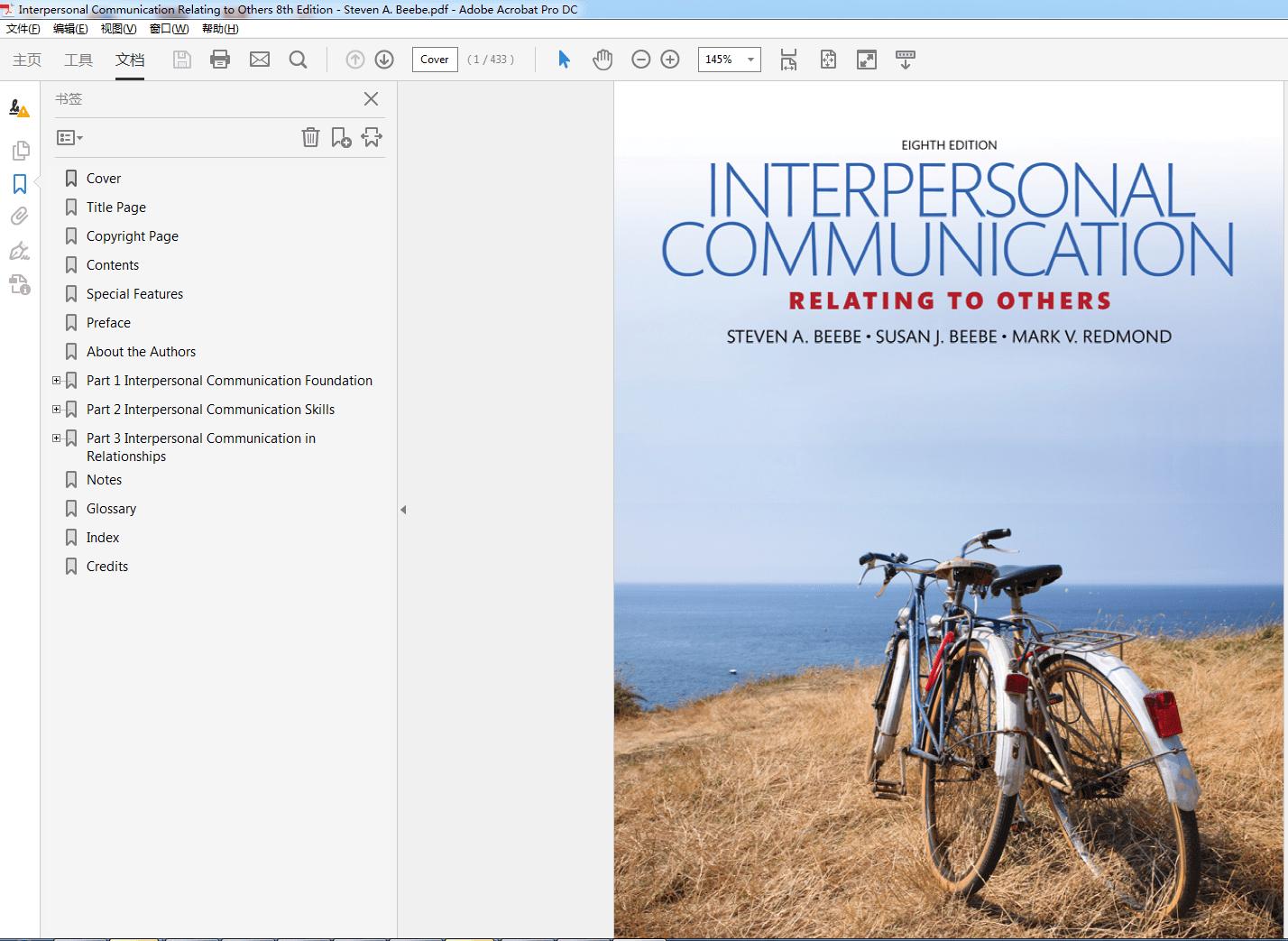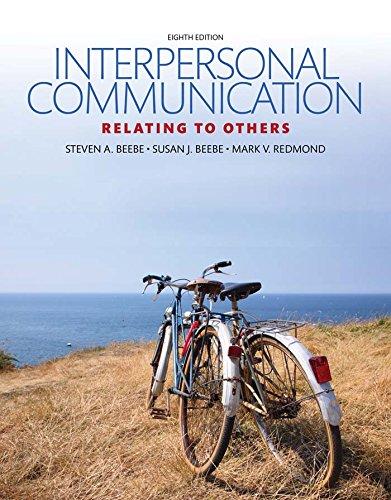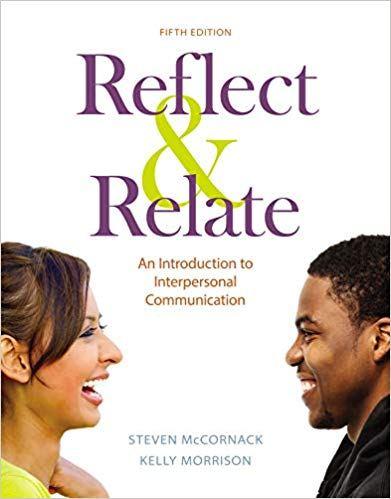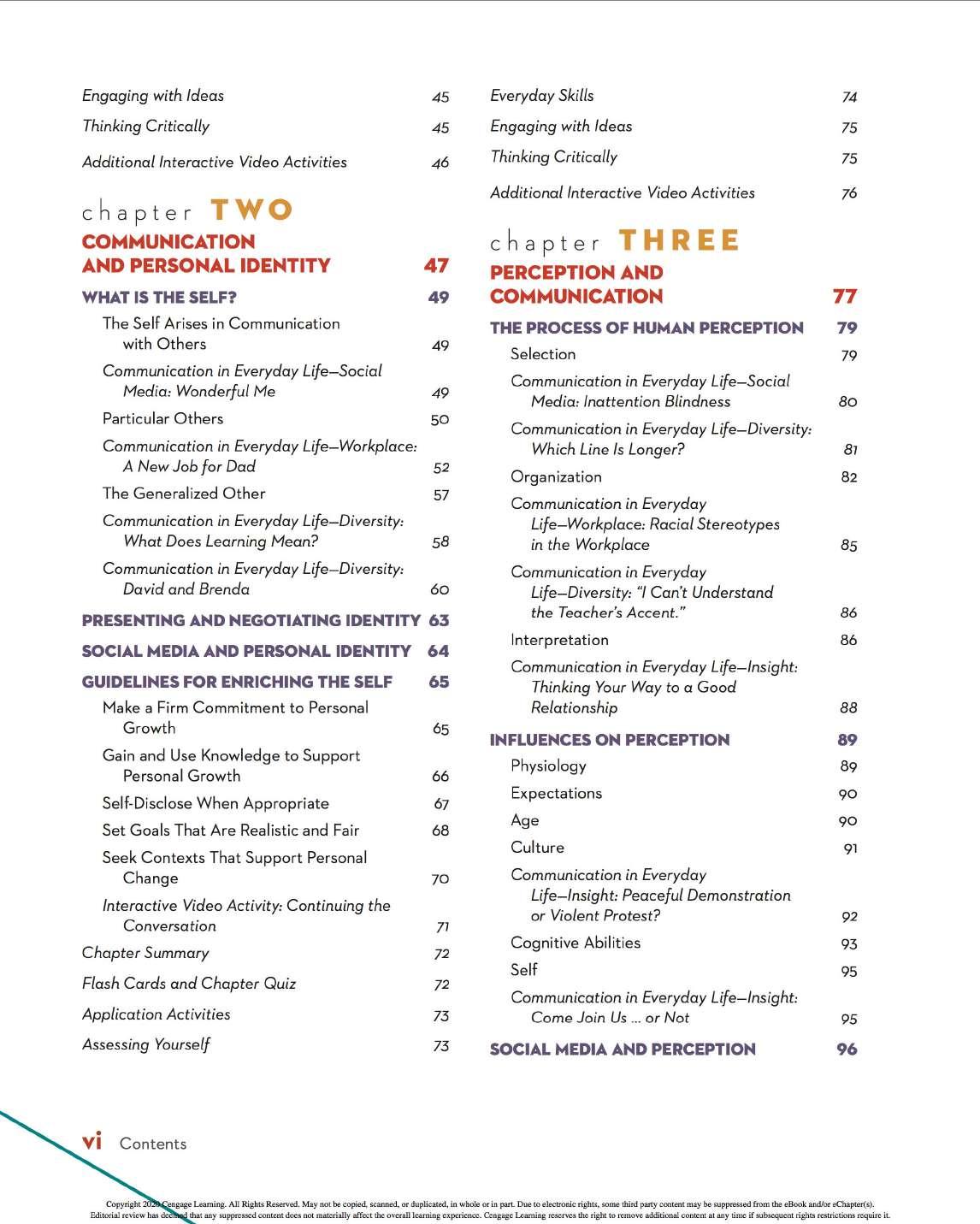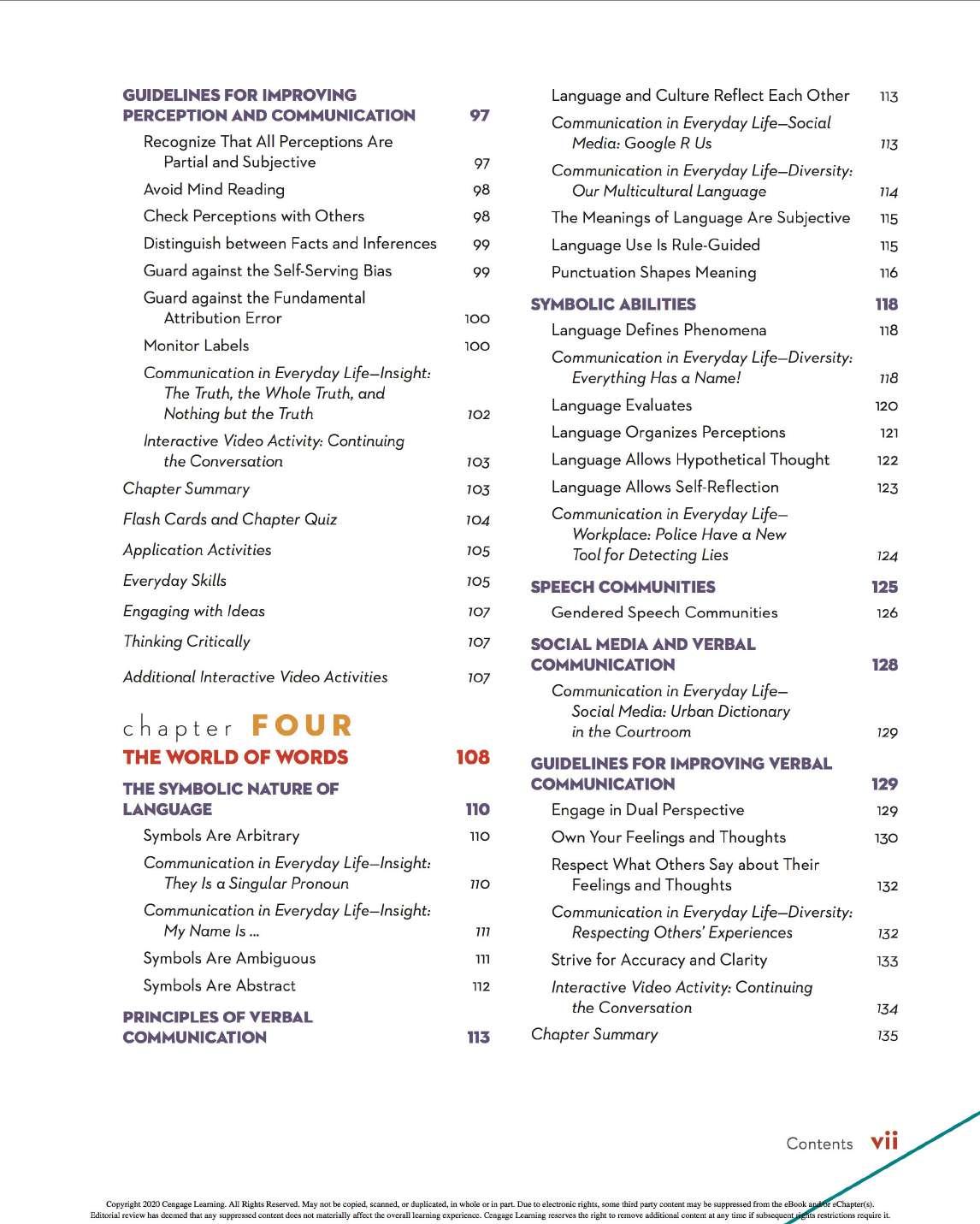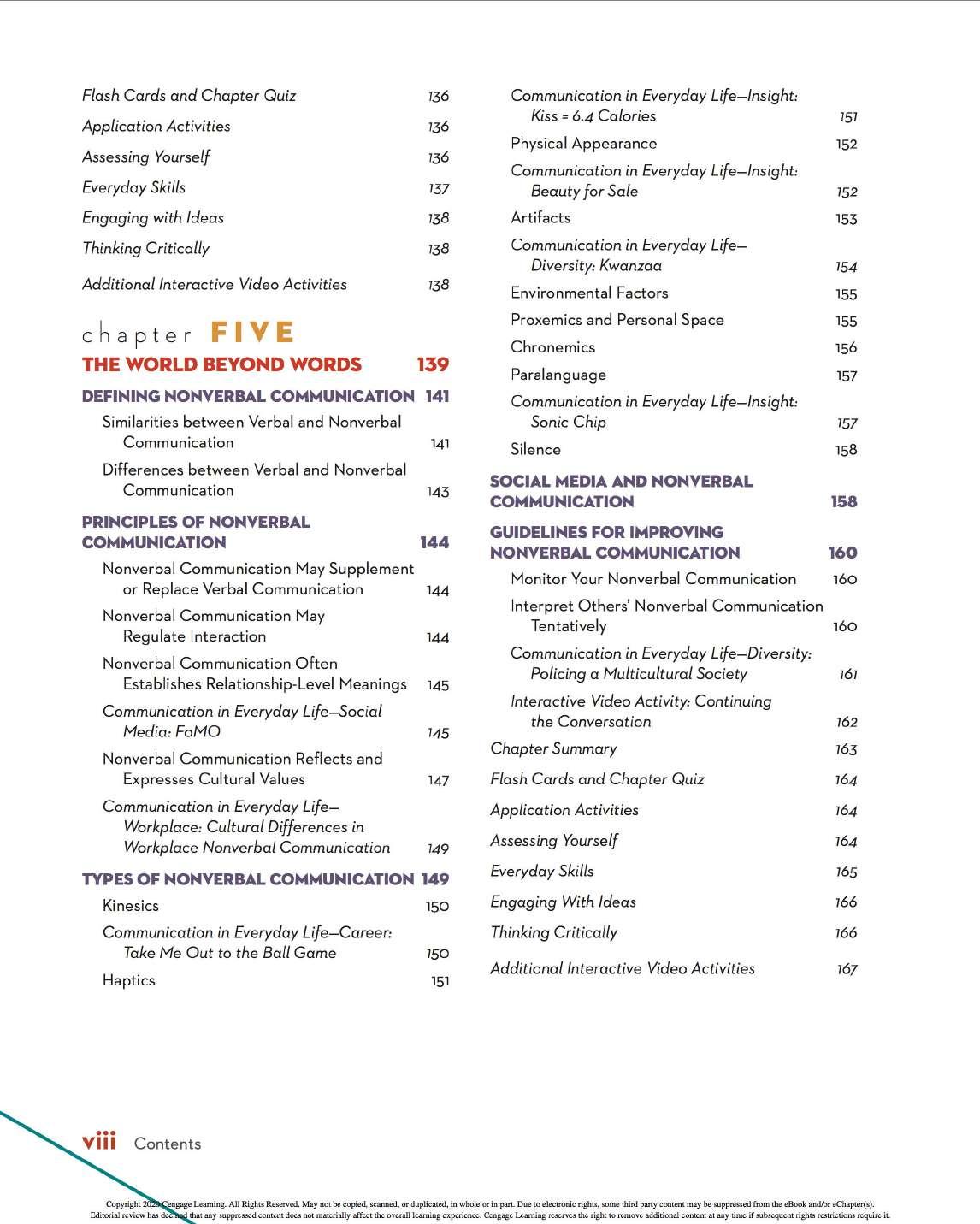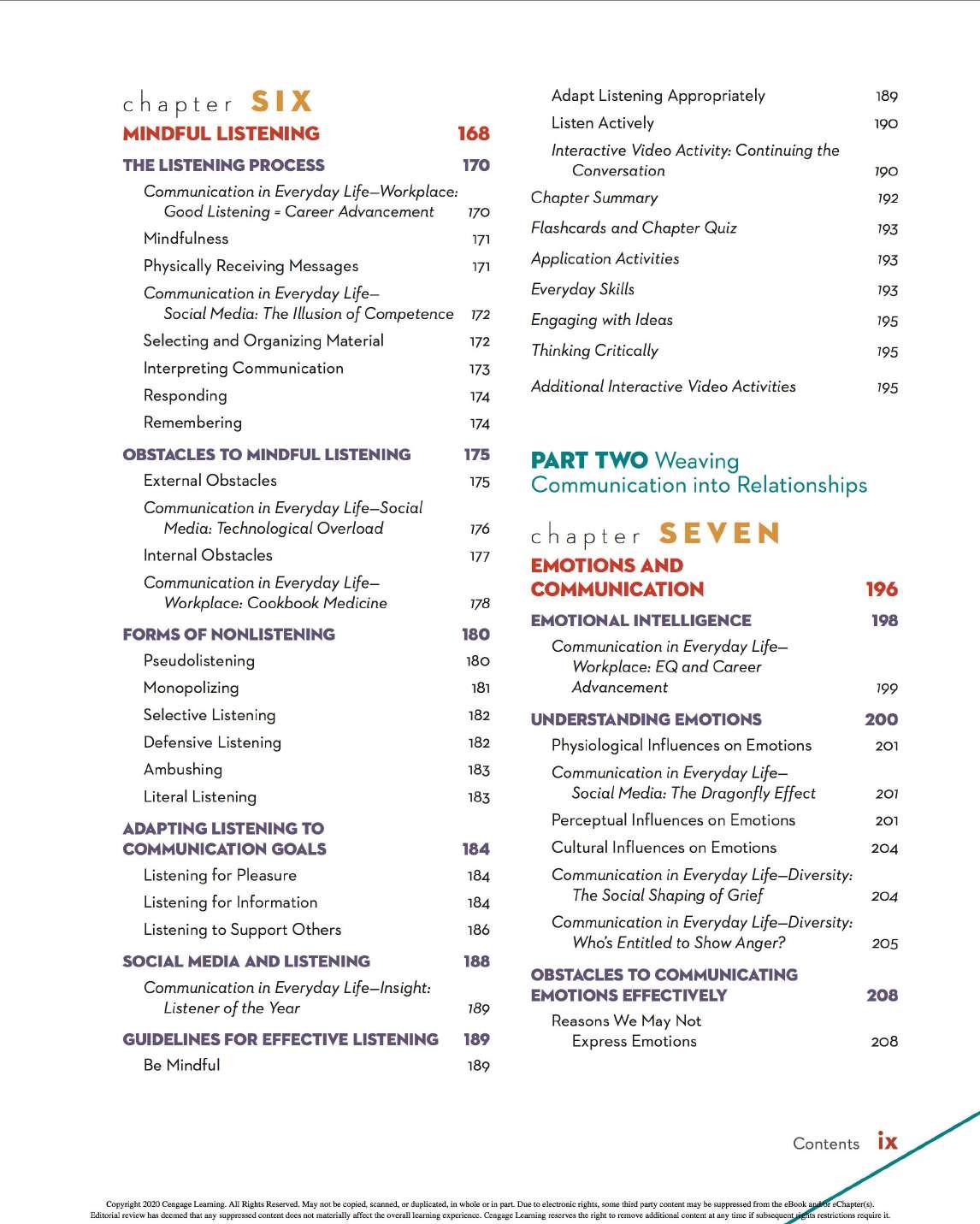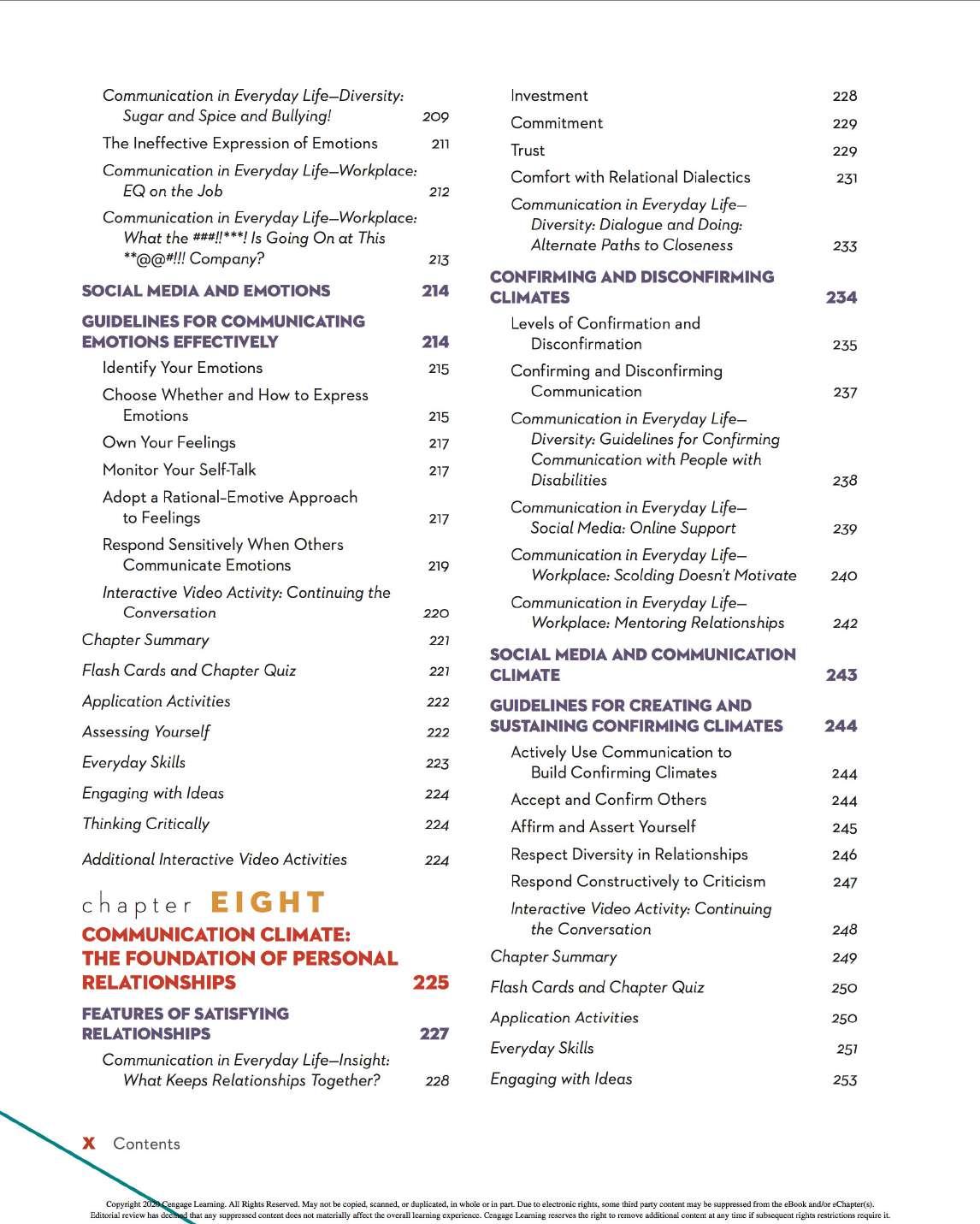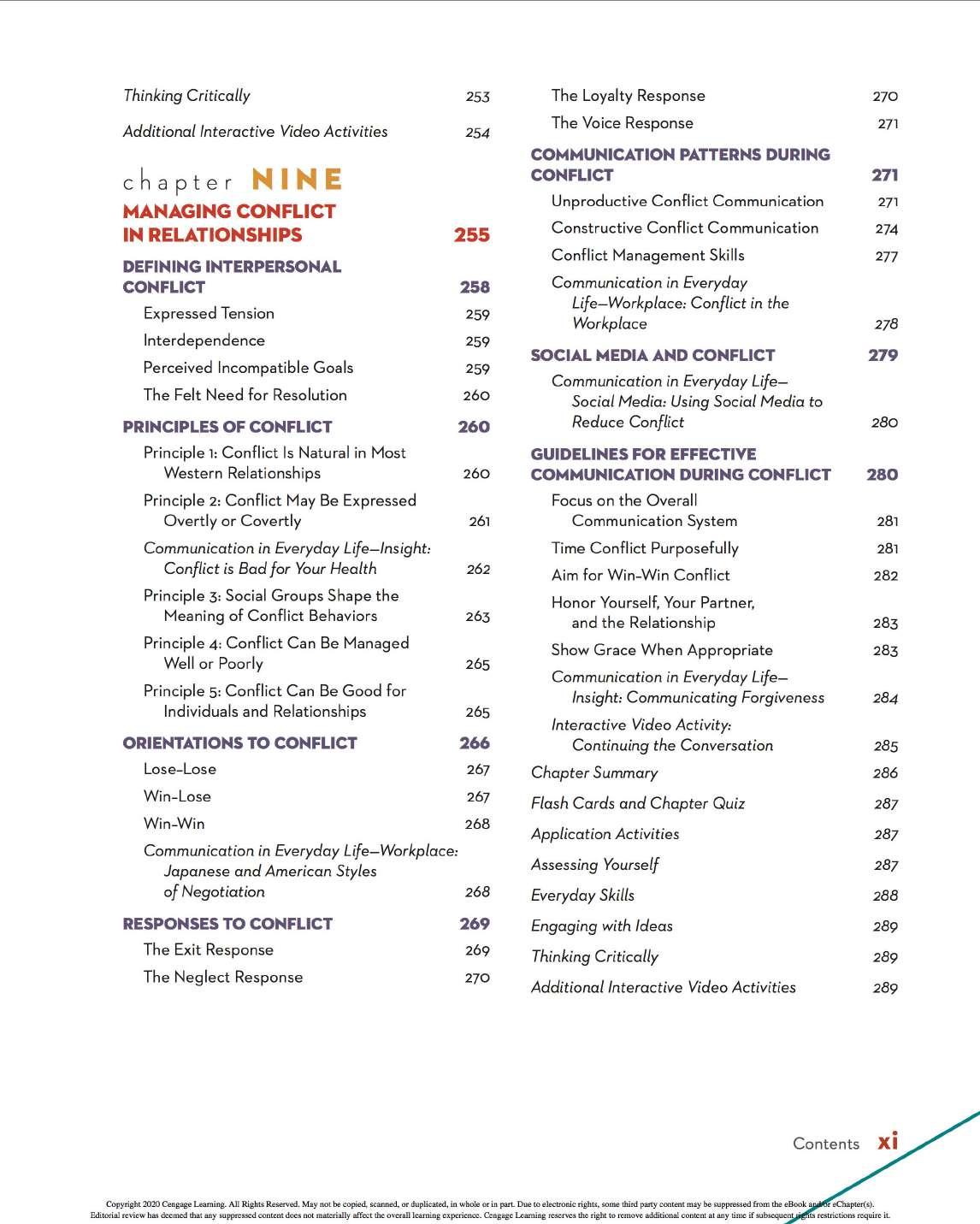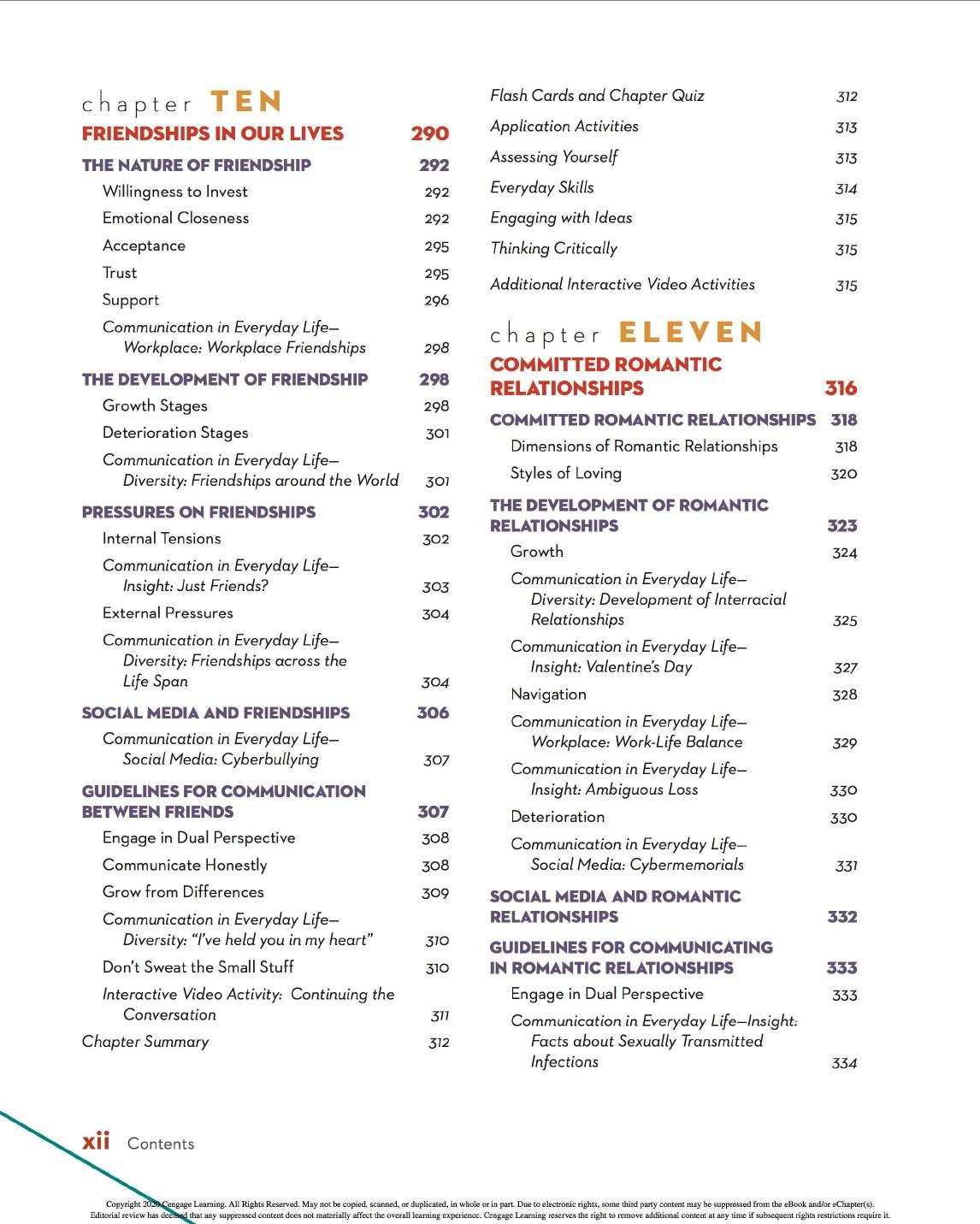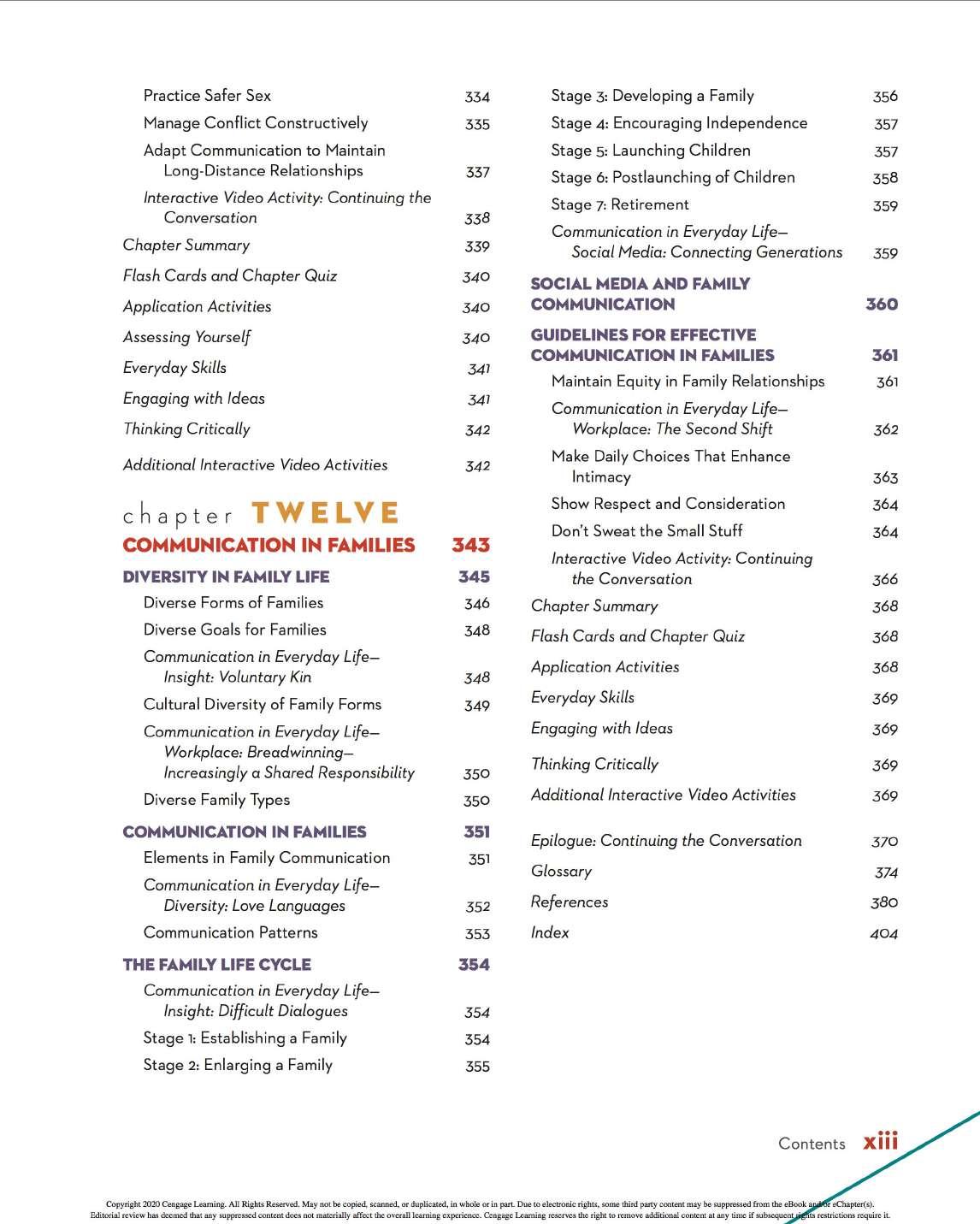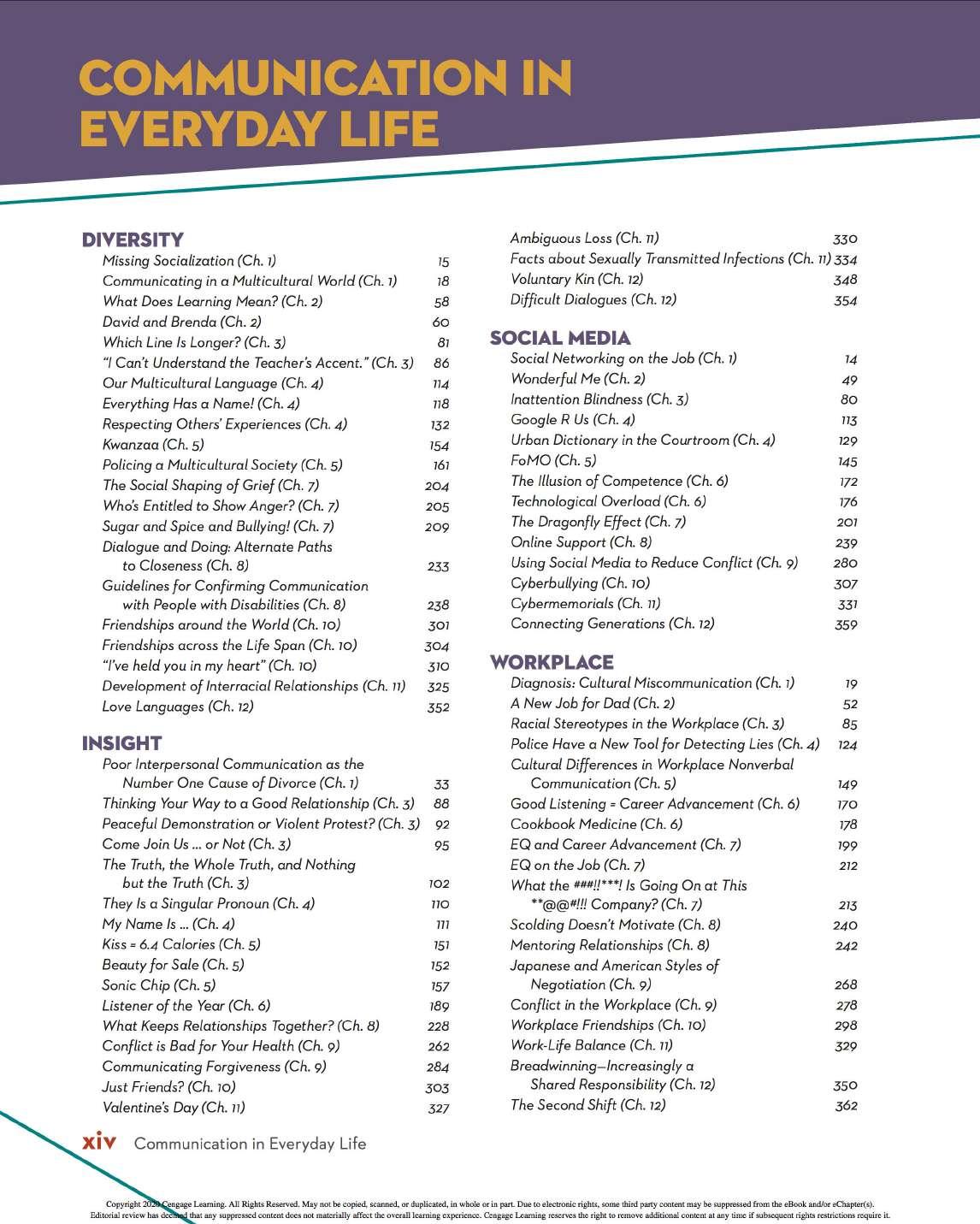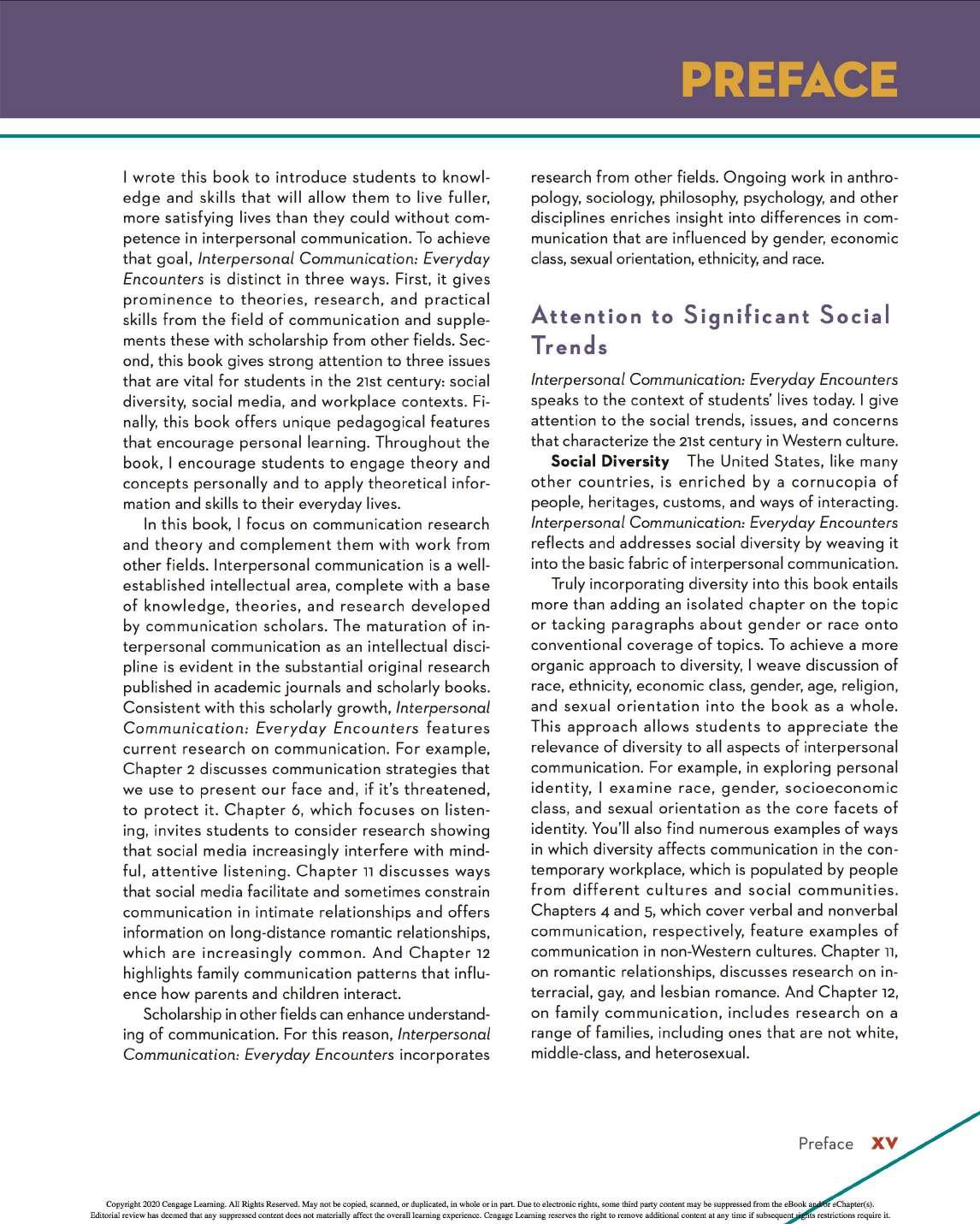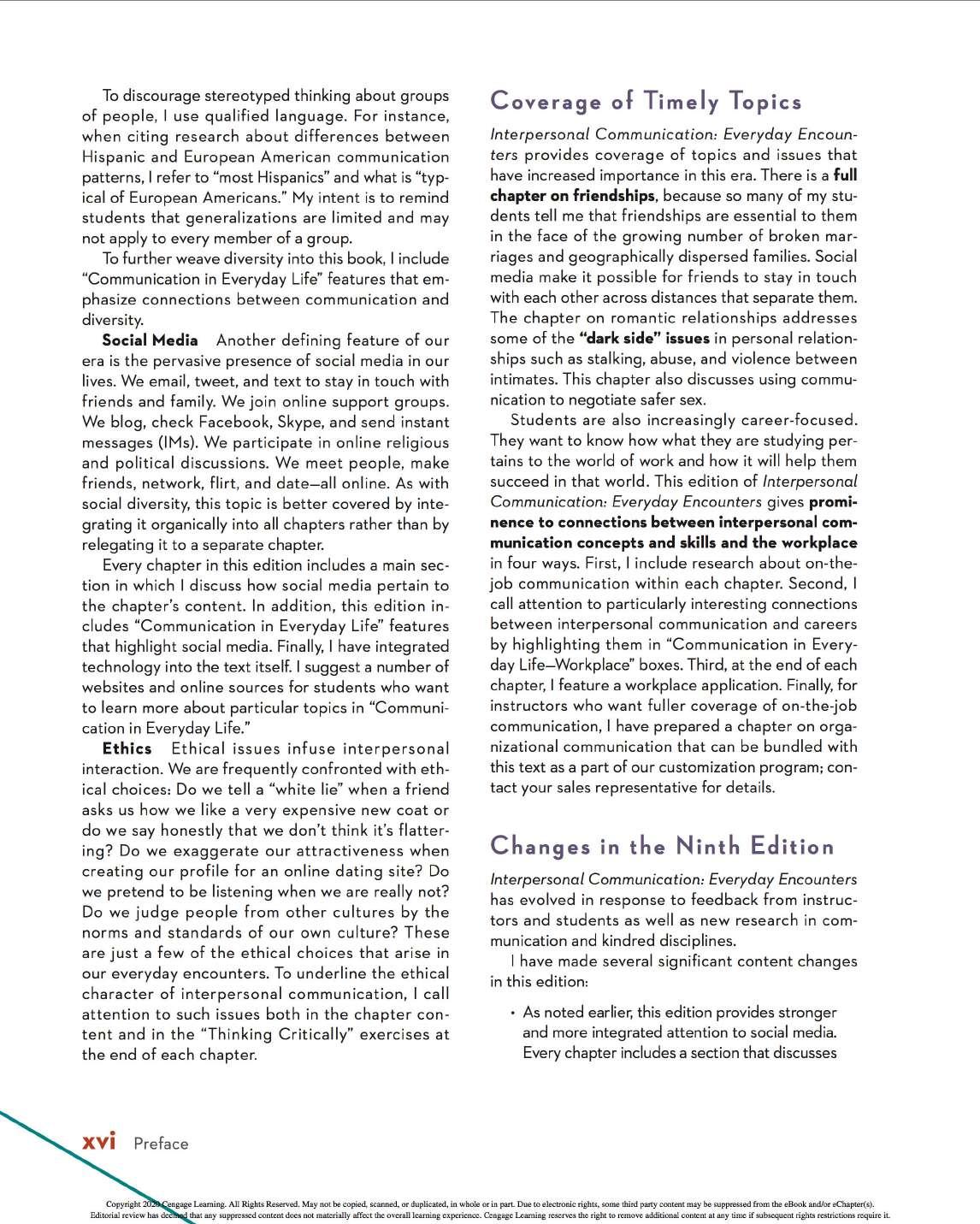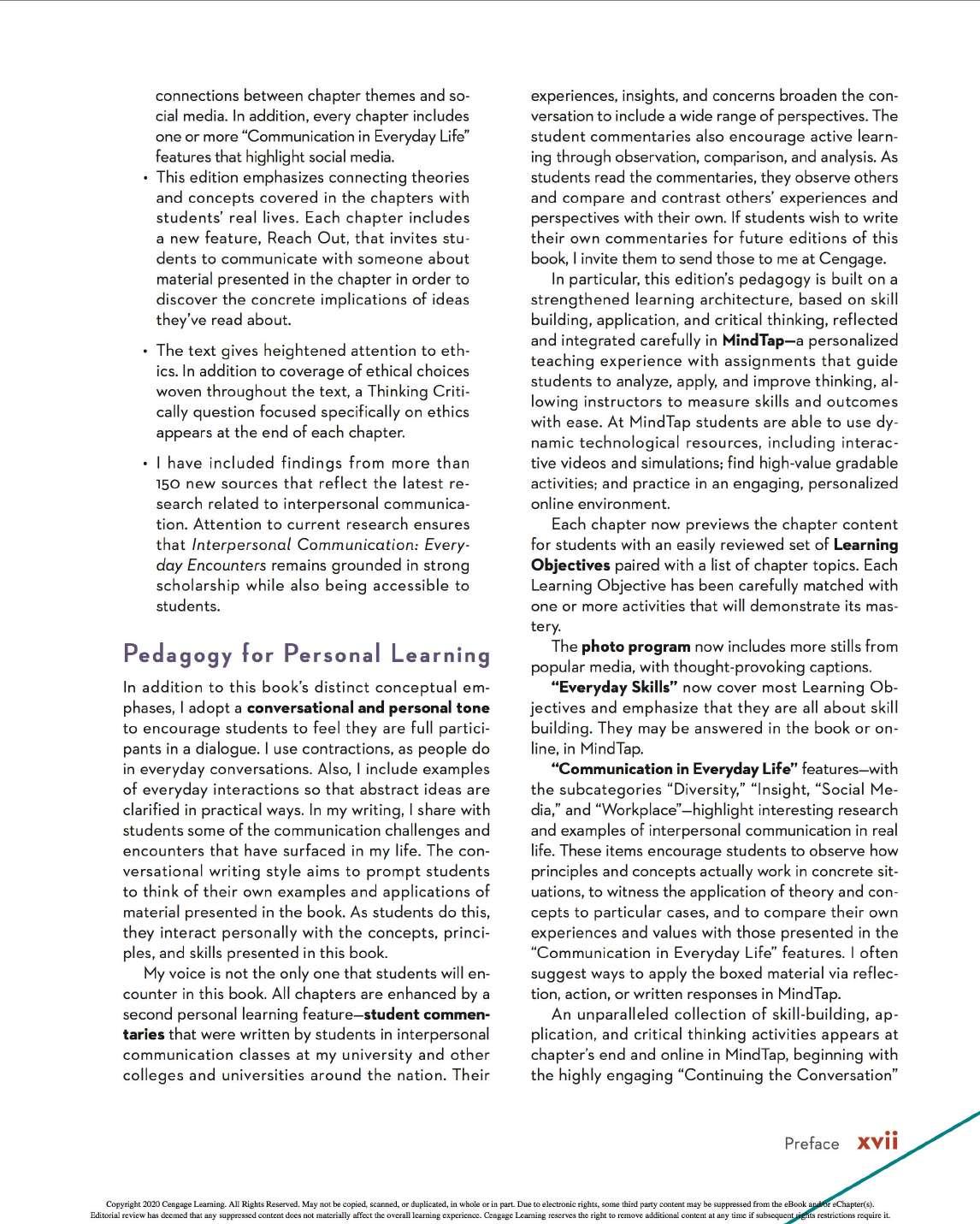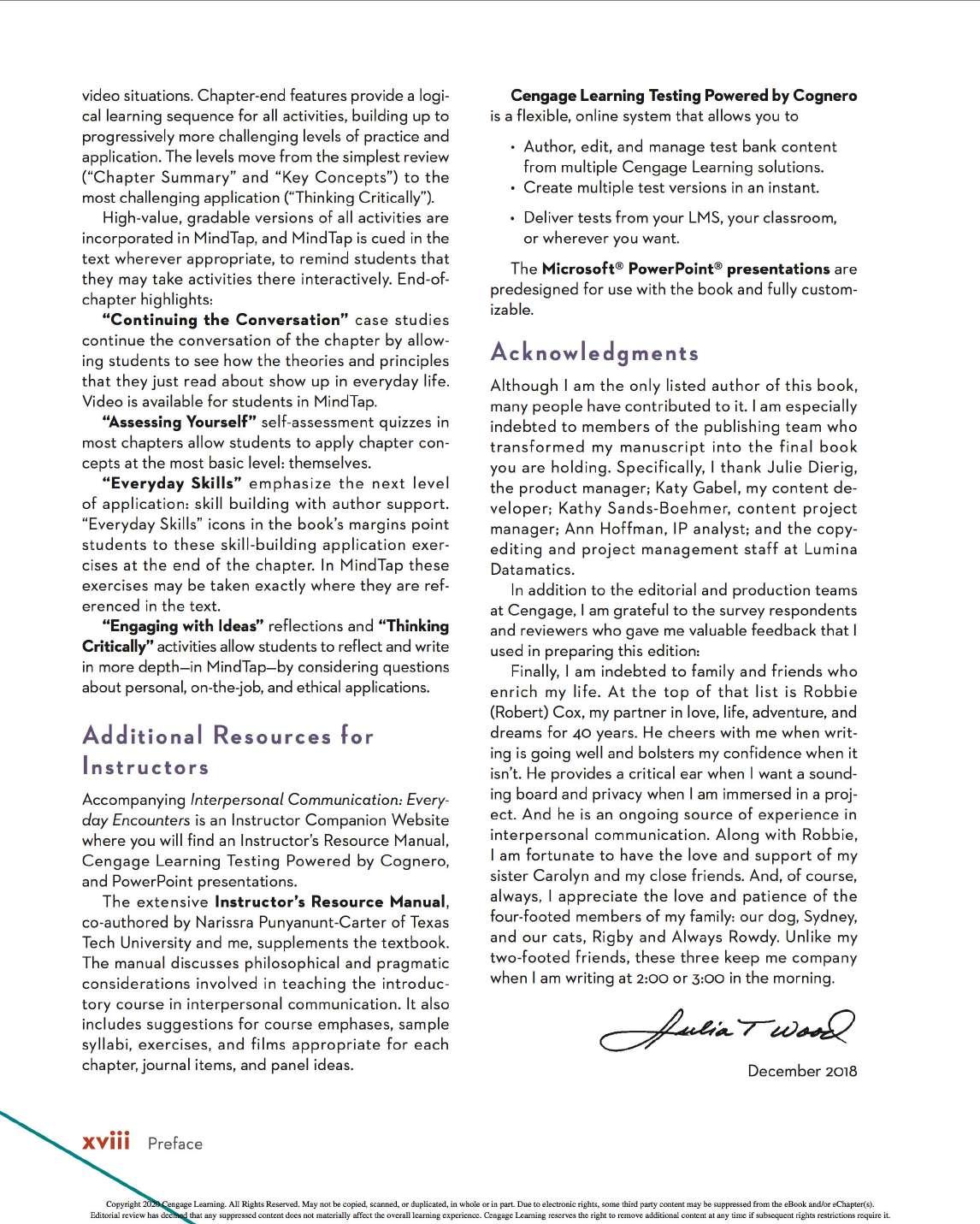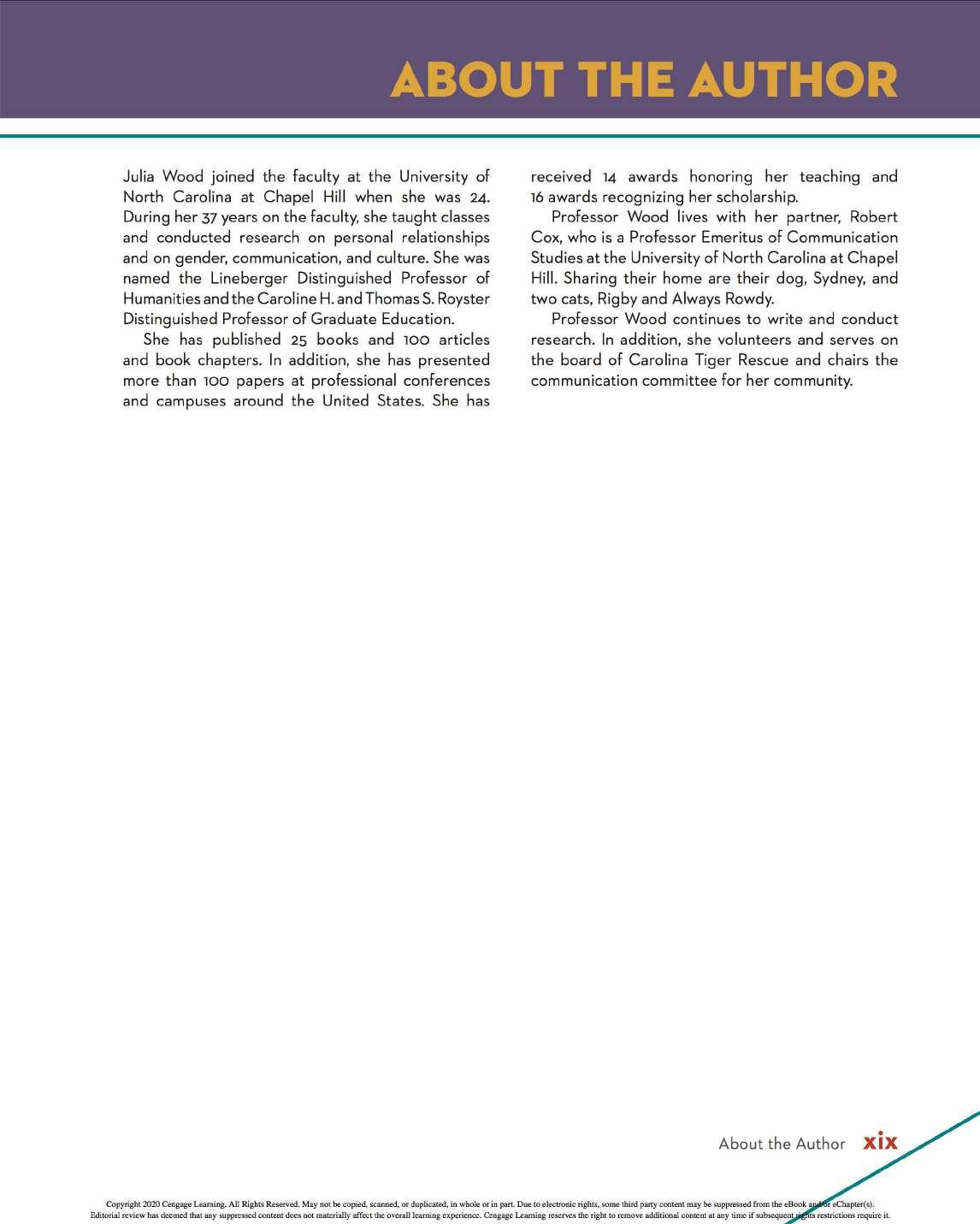https://ebookmass.com/product/etextbook-pdf-forinterpersonal-communication-everydayencounters-9th-edition/
Download more ebook from https://ebookmass.com
More products digital (pdf, epub, mobi) instant download maybe you interests ...
Interpersonal Communication: Everyday Encounters 9th Edition J.T. Wood
https://ebookmass.com/product/interpersonal-communicationeveryday-encounters-9th-edition-j-t-wood/
Interpersonal Communication 3rd Edition, (Ebook PDF)
https://ebookmass.com/product/interpersonal-communication-3rdedition-ebook-pdf/
(eTextbook PDF) for Interpersonal Communication Relating to Others 8th Edition
https://ebookmass.com/product/etextbook-pdf-for-interpersonalcommunication-relating-to-others-8th-edition/
Interpersonal Communication 3rd Edition – Ebook PDF
Version
https://ebookmass.com/product/interpersonal-communication-3rdedition-ebook-pdf-version/
Interpersonal Communication: Relating to Others 8th Edition, (Ebook PDF)
https://ebookmass.com/product/interpersonal-communicationrelating-to-others-8th-edition-ebook-pdf/
(eTextbook PDF) for Reflect and Relate: An Introduction to Interpersonal Communication 5th Edition
https://ebookmass.com/product/etextbook-pdf-for-reflect-andrelate-an-introduction-to-interpersonal-communication-5thedition/
(eBook PDF) The Interpersonal Communication Book, Global Edition 15th Edition
https://ebookmass.com/product/ebook-pdf-the-interpersonalcommunication-book-global-edition-15th-edition/
Communication in Everyday Life: A Survey of Communication 3rd Edition, (Ebook PDF)
https://ebookmass.com/product/communication-in-everyday-life-asurvey-of-communication-3rd-edition-ebook-pdf/
(eBook PDF) Intercultural Competence: Interpersonal Communication Across Cultures 8th Edition
https://ebookmass.com/product/ebook-pdf-intercultural-competenceinterpersonal-communication-across-cultures-8th-edition/
Interpreting
Responding
Remembering
External
Communication in
Life-Social Media: Technological Overload
Internal Obstacles
Communication in
LifeWorkplace: Cookbook Medicine FORMS
FRIENDSHIPS IN OUR LIVES
THE NATURE OF FRIENDSHIP
Willingness to Invest
Emotional Closeness
Acceptance
Trust
Support
Communication in Everyday LifeWorkplace: Workplace Friendships
DEVELOPMENT OF FRIENDSHIP
Communication in Everyday LifeDiversity: Friendships around the
PRESSURES ON FRIENDSHIPS
Internal Tensions
Communication in Everyday LifeInsight: Just Friends?
External Pressures
Communication in Everyday LifeDiversity: Friendships across the Life Span
Cyberbullying
FRIENDS
Engage in Dual Perspective
Communicate Honestly
Grow from Differences
Communication in Everyday LifeDiversity: "I've held you in my heart"
Don't Sweat the Small Stuff
Interactive
Communication in Everyday LifeDiversity: Development of Interracial Relationships
Communication in Everyday LifeInsight: Valentine's Day Navigation
Communication in Everyday LifeWorkplace: Work-Life Balance
Communication in Everyday LifeInsight: Ambiguous Loss
Deterioration
Communication in Everyday LifeSocial Media: Cybermemorials
MEDIA AND ROMANTIC
GUIDELINES FOR COMMUNICATING
Engage in Dual
in a Multicultural World (Ch 1)
Does Learning Mean? (Ch 2)
David and Brenda (Ch. 2)
Which Line Is Longer? (Ch 3)
"I Can 't Understand the Teacher's Accent. " (Ch 3)
Multicultural Language (Ch 4)
Has a Name! (Ch 4)
Others ' Experiences (Ch 4)
(Ch 5)
a Multicultural Society (Ch 5)
Social Shaping of Grief (Ch . 7)
's Entitled to Show Anger? (Ch 7)
and Spice and Bullying! (Ch 7)
Dialogue and Doing: Alternate Paths
to Closeness (Ch . 8)
Guidelines for Confirming Communication
with People with Disabilities (Ch . 8)
Friendships around the World (Ch. 10)
Friendships across the Life Span (Ch. 10) 304
"I've held you in my heart " (Ch 10)
Development of Interracial Relationships (Ch 77)
Love Languages (Ch 12)
(Ch. 12)
(Ch 12)
SOCIAL MEDIA
(Ch 3)
Dragonfly Effect (Ch 1)
(Ch . 8)
Media to Reduce Conflict (Ch . 9)
(Ch 10)
(Ch . 77)
Generations (Ch 12)
WORKPLACE
: Cultural Miscommunication (Ch 1)
New Job for Dad (Ch 2)
Stereotypes in the Workplace (Ch 3)
INSIGHT Police Have a New Tool for Detecting Lies (Ch 4) 124
Poor Interpersonal Communication as the Cultural Differences in Workplace Nonverbal Number One Cause of Divorce (Ch 1)
Communication (Ch 5)
Thinking Your Way to a Good Relationship (Ch 3) 88 Good Listening = Career Advancement (Ch 6)
Peaceful Demonstration or Violent Protest? (Ch 3)
Come Join Us ... or Not (Ch . 3)
The Truth , the Whole Truth , and Nothing
but the Truth (Ch. 3)
Medicine (Ch. 6)
and Career Advancement (Ch . 7)
on the Job (Ch 1)
the ###//***! Is Going On at This They Is a Singular Pronoun (Ch. 4)
Company? (Ch 7)
My Name Is ... (Ch. 4)
I wrote this book to introduce students to knowledge and skills that will allow them to live fuller , more satisfying lives than they could without competence in interpersonal communication To achieve that goal , Interpersonal Communication : Everyday Encounters is distinct in three ways First , it gives prominence to theories , research , and practical skills from the field of communication and supplements these with scholarship from other fields Second , this book gives strong attention to three issues that are vital for students in the 21st century: social diversity, social media , and workplace contexts Finally, this book offers unique pedagogical features that encourage personal learning Throughout the book , I encourage students to engage theory and concepts personally and to apply theoretical information and skills to their everyday lives
In this book , I focus on communication research and theory and complement them with work from other fields Interpersonal communication is a wellestablished intellectual area , complete with a base of knowledge , theories , and research developed by communication scholars . The maturation of interpersonal communication as an intellectual discipline is evident in the substantial original research published in academic journals and scholarly books. Consistent with this scholarly growth , Interpersonal Communication: Everyday Encounters features current research on communication . For example , Chapter 2 discusses communication strategies that we use to present our face and , if it's threatened , to protect it . Chapter 6 , which focuses on listening , invites students to consider research showing that social media increasingly interfere with mindful , attentive listening. Chapter 11 discusses ways that social media facilitate and sometimes constrain communication in intimate relationships and offers information on long-distance romantic relationships , which are increasingly common. And Chapter 12 highlights family communication patterns that influence how parents and children interact Scholarship in otherfields can enhance understanding of communication For this reason , Interpersonal Communicat ion : Everyday Encounters incorporates
research from other fields Ongoing work in anthropology, sociology, philosophy, psychology, and other disciplines enriches insight into differences in communication that are influenced by gender, economic class , sexual orientation , ethnicity, and race
Attention to Significant Social Trends
Interpersonal Communication : Everyday Encounters speaks to the context of students' lives today. I give attention to the social trends , issues , and concerns that characterize the 21st century in Western culture . Social Diversity The United States , like many other countries , is enriched by a cornucopia of people , heritages , customs , and ways of interacting . Interpersonal Communication : Everyday Encounters reflects and addresses social diversity by weaving it into the basic fabric of interpersonal communication . Truly incorporating diversity into this book entails more than adding an isolated chapter on the topic or tacking paragraphs about gender or race onto conventional coverage of topics To achieve a more organic approach to diversity, I weave discussion of race , ethnicity, economic class , gender, age , religion , and sexual orientation into the book as a whole This approach allows students to appreciate the relevance of diversity to all aspects of interpersonal communication For example , in exploring personal identity, I examine race , gender, socioeconomic class , and sexual orientation as the core facets of identity You'll also find numerous examples of ways in which diversity affects communication in the contemporary workplace , which is populated by people from different cultures and social communities Chapters 4 and 5 , which cover verbal and nonverbal communication , respectively, feature examples of communication in non-Western cultures. Chapter 11 , on romantic relationships , discusses research on interracial , gay, and lesbian romance . And Chapter 12 , on family communication , includes research on a range of families , including ones that are not white , middle-class , and heterosexual. Preface
To discourage stereotyped thinking about groups of people , I use qualified language For instance , when citing research about differences between Hispanic and European American communication patterns , I refer to "most Hispanics" and what is "typical of European Americans ." My intent is to remind students that generalizations are limited and may not apply to every member of a group
To further weave diversity into this book , I include "Communication in Everyday Life" features that emphasize connections between communication and diversity.
Social Media Another defining feature of our era is the pervasive presence of social media in our lives We email , tweet , and text to stay in touch with friends and family. We join online support groups . We blog , check Facebook , Skype , and send instant messages (IMs) . We participate in online religious and political discussions . We meet people , make friends , network , flirt , and date-all online As with social diversity, this topic is better covered by integrating it organically into all chapters rather than by relegating it to a separate chapter
Every chapter in this edition includes a main section in which I discuss how social media pertain to the chapter's content In addition , this edition includes "Communication in Everyday Life" features that highlight social media Finally, I have integrated technology into the text itself. I suggest a number of websites and online sources for students who want to learn more about particular topics in "Communication in Everyday Life ."
Ethics Ethical issues infuse interpersonal interaction We are frequently confronted with ethical choices: Do we tell a "white lie" when a friend asks us how we like a very expensive new coat or do we say honestly that we don ' t think it's flattering? Do we exaggerate our attractiveness when creating our profile for an online dating site? Do we pretend to be listening when we are really not? Do we judge people from other cultures by the norms and standards of our own culture? These are just a few of the ethical choices that arise in our everyday encounters To underline the ethical character of interpersonal communication , I call attention to such issues both in the chapter content and in the "Thinking Critically" exercises at the end of each chapter.
Coverage of Timely Topics
Interpersonal Communication : Everyday Encounters provides coverage of topics and issues that have increased importance in this era . There is a full chapter on friendships , because so many of my students tell me that friendships are essential to them in the face of the growing number of broken marriages and geographically dispersed families Social media make it possible for friends to stay in touch with each other across distances that separate them. The chapter on romantic relationships addresses some of the "dark side" issues in personal relationships such as stalking , abuse , and violence between intimates This chapter also discusses using communication to negotiate safer sex . Students are also increasingly career-focused . They want to know how what they are studying pertains to the world of work and how it will help them succeed in that world . This edition of Interpersonal Communication: Everyday Encounters gives prominence to connections between interpersonal communication concepts and skills and the workplace in four ways First , I include research about on-thejob communication within each chapter Second , I call attention to particularly interesting connections between interpersonal communication and careers by highlighting them in "Communication in Everyday Life-Workplace" boxes Third , at the end of each chapter, I feature a workplace application Finally, for instructors who want fuller coverage of on-the-job communication , I have prepared a chapter on organizational communication that can be bundled with this text as a part of our customization program; contact your sales representative for details .
Changes in the Ninth Edition
Interpersonal Communication: Everyday Encounters has evolved in response to feedback from instructors and students as well as new research in communication and kindred disciplines . I have made several significant content changes in this edition:
As noted earlier, this edition provides stronger and more integrated attention to social media Every chapter includes a section that discusses
Preface
connections between chapter themes and social media In addition, every chapter includes one or more "Communication in Everyday Life" features that highlight social media . This edition emphasizes connecting theories and concepts covered in the chapters with students' real lives Each chapter includes a new feature , Reach Out , that invites students to communicate with someone about material presented in the chapter in order to discover the concrete implications of ideas they've read about
The text gives heightened attention to ethics In addition to coverage of ethical choices woven throughout the text, a Thinking Critically question focused specifically on ethics appears at the end of each chapter.
I have included findings from more than 150 new sources that reflect the latest research related to interpersonal communication . Attention to current research ensures that Interpersonal Communication : Everyday Encounters remains grounded in strong scholarship while also being accessible to students.
Pedagogy for Personal Learning
In addition to this book 's distinct conceptual emphases , I adopt a conversational and personal tone to encourage students to feel they are full participants in a dialogue . I use contractions , as people do in everyday conversations Also, I include examples of everyday interactions so that abstract ideas are clarified in practical ways . In my writing, I share with students some of the communication challenges and encounters that have surfaced in my life The conversational writing style aims to prompt students to think of their own examples and applications of material presented in the book As students do this , they interact personally with the concepts , principles , and skills presented in this book .
My voice is not the only one that students will encounter in this book All chapters are enhanced by a second personal learning feature-student commentaries that were written by students in interpersonal communication classes at my university and other colleges and universities around the nation Their
experiences , insights , and concerns broaden the conversation to include a wide range of perspectives The student commentaries also encourage active learning through observation , comparison, and analysis . As students read the commentaries , they observe others and compare and contrast others ' experiences and perspectives with their own If students wish to write their own commentaries for future editions of this book, I invite them to send those to me at Cengage . In particular, this edition's pedagogy is built on a strengthened learning architecture , based on skill building , application, and critical thinking , reflected and integrated carefully in MindTap-a personalized teaching experience with assignments that guide students to analyze , apply, and improve thinking , allowing instructors to measure skills and outcomes with ease At MindTap students are able to use dynamic technological resources , including interactive videos and simulations; find high-value gradable activities; and practice in an engaging, personalized online environment
Each chapter now previews the chapter content for students with an easily reviewed set of Learning Objectives paired with a list of chapter topics Each Learning Objective has been carefully matched with one or more activities that will demonstrate its mastery.
The photo program now includes more stills from popular media , with thought-provoking captions.
"Everyday Skills" now cover most Learning Objectives and emphasize that they are all about skill building They may be answered in the book or online , in MindTap . "Communication in Everyday Life" features-with the subcategories "Diversity," "Insight, "Social Media," and "Workplace"-highlight interesting research and examples of interpersonal communication in real life These items encourage students to observe how principles and concepts actually work in concrete situations, to witness the application of theory and concepts to particular cases , and to compare their own experiences and values with those presented in the "Communication in Everyday Life" features I often suggest ways to apply the boxed material via reflection , action, or written responses in MindTap
An unparalleled collection of skill-building , application , and critical thinking activities appears at chapter 's end and online in MindTap , beginning with the highly engaging "Continuing the Conversation" Preface
video situations . Chapter-end features provide a logical learning sequence for all activities , building up to progressively more challenging levels of practice and application . The levels move from the simplest review ("Chapter Summary" and "Key Concepts") to the most challenging application ("Thinking Critically") .
High-value , gradable versions of all activities are incorporated in tv1indTap , and tv1indTap is cued in the text wherever appropriate , to remind students that they may take activities there interactively End-ofchapter highlights:
"Continuing the Conversation" case studies continue the conversation of the chapter by allowing students to see how the theories and principles that they just read about show up in everyday life . Video is available for students in tv1indTap .
"Assessing Yourself" self-assessment quizzes in most chapters allow students to apply chapter concepts at the most basic level: themselves .
"Everyday Skills" emphasize the next level of application: skill building with author support "Everyday Skills" icons in the book's margins point students to these skill-building application exercises at the end of the chapter In tv1indTap these exercises may be taken exactly where they are referenced in the text
"Engaging with Ideas" reflections and "Thinking Critically" activities allow students to reflect and write in more depth-in tv1indTap-by considering questions about personal , on-the-job, and ethical applications .
Additional Resources for Instructors
Accompanying Interpersonal Communicat ion : Everyday Encounters is an Instructor Companion Website where you will find an Instructor 's Resource Manual , Cengage Learning Testing Powered by Cognero , and PowerPoint presentations
The extensive Instructor's Resource Manual , co-authored by Narissra Punyanunt-Carter of Texas Tech University and me , supplements the textbook The manual discusses philosophical and pragmatic considerations involved in teaching the introductory course in interpersonal communication It also includes suggestions for course emphases , sample syllabi , exercises , and films appropriate for each chapter, journal items , and panel ideas
Cengage Learning Testing Powered by Cognero is a flexible, online system that allows you to
Author, edit , and manage test bank content from multiple Cengage Learning solutions
Create multiple test versions in an instant .
Deliver tests from your Ltv1S , your classroom , or wherever you want
The Microsoft ® PowerPoint ® presentations are predesigned for use with the book and fully customizable
Acknowledgments
Although I am the only listed author of this book , many people have contributed to it I am especially indebted to members of the publishing team who transformed my manuscript into the final book you are holding Specifically, I thank Julie Dierig , the product manager; Katy Gabel , my content developer; Kathy Sands-Boehmer, content project manager; Ann Hoffman , IP analyst; and the copyediting and project management staff at Lumina Datamatics .
In addition to the editorial and production teams at Cengage , I am grateful to the survey respondents and reviewers who gave me valuable feedback that I used in preparing this edition:
Finally, I am indebted to family and friends who enrich my life At the top of that list is Robbie (Robert) Cox , my partner in love , life , adventure , and dreams for 40 years . He cheers with me when writing is going well and bolsters my confidence when it isn't . He provides a critical ear when I want a sounding board and privacy when I am immersed in a project . And he is an ongoing source of experience in interpersonal communication Along with Robbie , I am fortunate to have the love and support of my sister Carolyn and my close friends . And , of course , always , I appreciate the love and patience of the four-footed members of my family: our dog , Sydney, and our cats , Rigby and Always Rowdy. Unlike my two-footed friends , these three keep me company when I am writing at 2:00 or 3:00 in the morning
December 2018
Preface
Julia Wood joined the faculty at the University of North Carolina at Chapel Hill when she was 24 During her 37 years on the faculty, she taught classes and conducted research on personal relationships and on gender, communication, and culture . She was named the Lineberger Distinguished Professor of Humanities and the Caroline H. and Thomas S Royster Distinguished Professor of Graduate Education
She has published 25 books and 100 articles and book chapters In addition , she has presented more than 100 papers at professional conferences and campuses around the United States . She has
received 14 awards honoring her teaching and 16 awards recognizing her scholarship.
Professor Wood lives with her partner, Robert Cox, who is a Professor Emeritus of Communication Studies at the University of North Carolina at Chapel Hill. Sharing their home are their dog , Sydney, and two cats , Rigby and Always Rowdy
Professor Wood continues to write and conduct research In addition , she volunteers and serves on the board of Carolina Tiger Rescue and chairs the communication committee for her community
About the Author
Another random document with no related content on Scribd:
river coming down like this. Well, I hadn't got very far—by the way, I took Jock with me. I'm sure he thinks I'm mad, too. Not that he says anything; these people here never commit themselves——"
"Confound Jock! Get on with it."
"Oh—well, before we'd got very far, we saw a fellow wading about in the river with a rod and a creel. I didn't pay much attention, because, you see, I was wondering what you——Yes. Well! Jock noticed him and said to me, 'Yon's a queer kind of fisherman, I'm thinkin'.' So I had a look, and there he was, staggering about among the stones with his fly floating away down the stream in front of him; and he was peering into all the pools he came to, and poking about with a gaff. So I hailed him, and he turned round, and then he put the gaff away in a bit of a hurry and started to reel in his line. He made an awful mess of it," added Macpherson appreciatively.
"I can believe it," said Wimsey. "A man who admits to catching trout with a Pink Sisket would make a mess of anything."
"A pink what?"
"Never mind. I only meant that Robert was no fisher. Get on."
"Well, he got the line hooked round something, and he was pulling and hauling, you know, and splashing about, and then it came out all of a sudden, and he waved it all over the place and got my hat. That made me pretty wild, and I made after him, and he looked round again, and I yelled out, 'Good God, it's Robert!' And he dropped his rod and took to his heels. And of course he slipped on the stones and came down an awful crack. We rushed forward and scooped him up and brought him home. He's got a nasty bang on the head and a fractured patella. Very interesting. I should have liked to have a shot at setting it myself, but it wouldn't do, you know, so I sent for Strachan. He's a good man."
"You've had extraordinary luck about this business so far," said Wimsey. "Now the only thing left is to find Great-Uncle. How far down have you got?"
"Not very far. You see, what with getting Robert home and setting his knee and so on, we couldn't do much yesterday."
"Damn Robert! Great-Uncle may be away out to sea by this time. Let's get down to it."
He took up a gaff from the umbrella-stand ("Robert's," interjected Macpherson), and led the way out. The little river was foaming down in a brown spate, rattling stones and small boulders along in its passage. Every hole, every eddy might be a lurking-place for GreatUncle Joseph. Wimsey peered irresolutely here and there—then turned suddenly to Jock.
"Where's the nearest spit of land where things usually get washed up?" he demanded.
"Eh, well! there's the Battery Pool, about a mile doon the river. Ye'll whiles find things washed up there. Aye. Imph'm. There's a pool and a bit sand, where the river mak's a bend. Ye'll mebbe find it there, I'm thinkin'. Mebbe no. I couldna say."
"Let's have a look, anyway."
Macpherson, to whom the prospect of searching the stream in detail appeared rather a dreary one, brightened a little at this.
"That's a good idea. If we take the car down to just above Gatehouse, we've only got two fields to cross."
The car was still at the door; the hired driver was enjoying the hospitality of the cottage. They pried him loose from Maggie's scones and slipped down the road to Gatehouse.
"Those gulls seem rather active about something," said Wimsey, as they crossed the second field. The white wings swooped backwards and forwards in narrowing circles over the yellow shoal. Raucous cries rose on the wind. Wimsey pointed silently with his hand. A long, unseemly object, like a drab purse, lay on the shore. The gulls, indignant, rose higher, squawking at the intruders. Wimsey ran forward, stooped, rose again with the long bag dangling from his fingers.
"Great-Uncle Joseph, I presume," he said, and raised his hat with old-fashioned courtesy.
"The gulls have had a wee peck at it here and there," said Jock. "It'll be tough for them. Aye. They havena done so vera much with it."
"Aren't you going to open it?" said Macpherson impatiently.
"Not here," said Wimsey. "We might lose something." He dropped it into Jock's creel. "We'll take it home first and show it to Robert."
Robert greeted them with ill-disguised irritation.
"We've been fishing," said Wimsey cheerfully. "Look at our bonny wee fush." He weighed the catch in his hand. "What's inside this wee fush, Mr. Ferguson?"
"I haven't the faintest idea," said Robert.
"Then why did you go fishing for it?" asked Wimsey pleasantly. "Have you got a surgical knife there, Mac?"
"Yes—here. Hurry up."
"I'll leave it to you. Be careful. I should begin with the stomach."
Macpherson laid Great-Uncle Joseph on the table, and slit him open with a practised hand.
"Gude be gracious to us!" cried Maggie, peering over his shoulder. "What'll that be?"
Wimsey inserted a delicate finger and thumb into the cavities of Uncle Joseph. "One—two—three——" The stones glittered like fire as he laid them on the table. "Seven—eight—nine. That seems to be all. Try a little farther down, Mac."
Speechless with astonishment, Mr. Macpherson dissected his legacy.
"Ten—eleven," said Wimsey. "I'm afraid the sea-gulls have got number twelve. I'm sorry, Mac."
"But how did they get there?" demanded Robert foolishly.
"Simple as shelling peas. Great-Uncle Joseph makes his will, swallows his diamonds——"
"He must ha' been a grand man for a pill," said Maggie, with respect.
"—and jumps out of the window. It was as clear as crystal to anybody who read the will. He told you, Mac, that the stomach was given you to study."
Robert Ferguson gave a deep groan.
"I knew there was something in it," he said. "That's why I went to look up the will. And when I saw you there, I knew I was right. (Curse this leg of mine!) But I never imagined for a moment——"
His eyes appraised the diamonds greedily.
"And what will the value of these same stones be?" enquired Jock.
"About seven thousand pounds apiece, taken separately. More than that, taken together."
"The old man was mad," said Robert angrily. "I shall dispute the will."
"I think not," said Wimsey. "There's such an offence as entering and stealing, you know."
"My God!" said Macpherson, handling the diamonds like a man in a dream. "My God!"
"Seven thousan' pund," said Jock. "Did I unnerstan' ye richtly to say that one o' they gulls is gaun aboot noo wi' seven thousan' punds' worth o' diamonds in his wame? Ech! it's just awfu' to think of. Guid day to you, sirs. I'll be gaun round to Jimmy McTaggart to ask will he lend me the loan o' a gun."
THE UNSOLVED PUZZLE OF THE MAN WITH NO FACE
"And what would you say, sir," said the stout man, "to this here business of the bloke what's been found down on the beach at East Felpham?"
The rush of travellers after the Bank Holiday had caused an overflow of third-class passengers into the firsts, and the stout man was anxious to seem at ease in his surroundings. The youngish gentleman whom he addressed had obviously paid full fare for a seclusion which he was fated to forgo. He took the matter amiably enough, however, and replied in a courteous tone:
"I'm afraid I haven't read more than the headlines. Murdered, I suppose, wasn't he?"
"It's murder, right enough," said the stout man, with relish. "Cut about he was, something shocking."
"More like as if a wild beast had done it," chimed in the thin, elderly man opposite. "No face at all he hadn't got, by what my paper says. It'll be one of these maniacs, I shouldn't be surprised, what goes about killing children."
"I wish you wouldn't talk about such things," said his wife, with a shudder. "I lays awake at nights thinking what might 'appen to Lizzie's girls, till my head feels regular in a fever, and I has such a sinking in my inside I has to get up and eat biscuits. They didn't ought to put such dreadful things in the papers."
"It's better they should, ma'am," said the stout man, "then we're warned, so to speak, and can take our measures accordingly. Now, from what I can make out, this unfortunate gentleman had gone bathing all by himself in a lonely spot. Now, quite apart from
cramps, as is a thing that might 'appen to the best of us, that's a very foolish thing to do."
"Just what I'm always telling my husband," said the young wife. The young husband frowned and fidgeted. "Well, dear, it really isn't safe, and you with your heart not strong——" Her hand sought his under the newspaper. He drew away, self-consciously, saying, "That'll do, Kitty."
"The way I look at it is this," pursued the stout man. "Here we've been and had a war, what has left 'undreds o' men in what you might call a state of unstable ekilibrium. They've seen all their friends blown up or shot to pieces. They've been through five years of 'orrors and bloodshed, and it's given 'em what you might call a twist in the mind towards 'orrors. They may seem to forget it and go along as peaceable as anybody to all outward appearance, but it's all artificial, if you get my meaning. Then, one day something 'appens to upset them—they 'as words with the wife, or the weather's extra hot, as it is to-day—and something goes pop inside their brains and makes raving monsters of them. It's all in the books. I do a good bit of reading myself of an evening, being a bachelor without encumbrances."
"That's all very true," said a prim little man, looking up from his magazine, "very true indeed—too true. But do you think it applies in the present case? I've studied the literature of crime a good deal—I may say I make it my hobby and it's my opinion there's more in this than meets the eye. If you will compare this murder with some of the most mysterious crimes of late years—crimes which, mind you, have never been solved, and, in my opinion, never will be— what do you find?" He paused and looked round. "You will find many features in common with this case. But especially you will find that the face—and the face only, mark you—has been disfigured, as though to prevent recognition. As though to blot out the victim's personality from the world. And you will find that, in spite of the most thorough investigation, the criminal is never discovered. Now what does all that point to? To organisation. Organisation. To an
immensely powerful influence at work behind the scenes. In this very magazine that I'm reading now"—he tapped the page impressively—"there's an account—not a faked-up story, but an account extracted from the annals of the police—of the organisation of one of these secret societies, which mark down men against whom they bear a grudge, and destroy them. And, when they do this, they disfigure their faces with the mark of the Secret Society, and they cover up the track of the assassin so completely—having money and resources at their disposal—that nobody is ever able to get at them."
"I've read of such things, of course," admitted the stout man, "but I thought as they mostly belonged to the medeevial days. They had a thing like that in Italy once. What did they call it now? A Gomorrah, was it? Are there any Gomorrahs nowadays?"
"You spoke a true word, sir, when you said Italy," replied the prim man. "The Italian mind is made for intrigue. There's the Fascisti. That's come to the surface now, of course, but it started by being a secret society. And, if you were to look below the surface, you would be amazed at the way in which that country is honeycombed with hidden organisations of all sorts. Don't you agree with me, sir?" he added, addressing the first-class passenger.
"Ah!" said the stout man, "no doubt this gentleman has been in Italy and knows all about it. Should you say this murder was the work of a Gomorrah, sir?"
"I hope not, I'm sure," said the first-class passenger. "I mean, it rather destroys the interest, don't you think? I like a nice, quiet, domestic murder myself, with the millionaire found dead in the library. The minute I open a detective story and find a Camorra in it, my interest seems to dry up and turn to dust and ashes—a sort of Sodom and Camorra, as you might say."
"I agree with you there," said the young husband, "from what you might call the artistic standpoint. But in this particular case I think
there may be something to be said for this gentleman's point of view."
"Well," admitted the first-class passenger, "not having read the details——"
"The details are clear enough," said the prim man. "This poor creature was found lying dead on the beach at East Felpham early this morning, with his face cut about in the most dreadful manner. He had nothing on him but his bathing-dress——"
"Stop a minute. Who was he, to begin with?"
"They haven't identified him yet. His clothes had been taken——"
"That looks more like robbery, doesn't it?" suggested Kitty.
"If it was just robbery," retorted the prim man, "why should his face have been cut up in that way? No—the clothes were taken away, as I said, to prevent identification. That's what these societies always try to do."
"Was he stabbed?" demanded the first-class passenger.
"No," said the stout man. "He wasn't. He was strangled."
"Not a characteristically Italian method of killing," observed the firstclass passenger.
"No more it is," said the stout man. The prim man seemed a little disconcerted.
"And if he went down there to bathe," said the thin, elderly man, "how did he get there? Surely somebody must have missed him before now, if he was staying at Felpham. It's a busy spot for visitors in the holiday season."
"No," said the stout man, "not East Felpham. You're thinking of West Felpham, where the yacht-club is. East Felpham is one of the loneliest spots on the coast. There's no house near except a little pub all by itself at the end of a long road, and after that you have to
go through three fields to get to the sea. There's no real road, only a cart-track, but you can take a car through. I've been there."
"He came in a car," said the prim man. "They found the track of the wheels. But it had been driven away again."
"It looks as though the two men had come there together," suggested Kitty.
"I think they did," said the prim man. "The victim was probably gagged and bound and taken along in the car to the place, and then he was taken out and strangled and——"
"But why should they have troubled to put on his bathing-dress?" said the first-class passenger.
"Because," said the prim man, "as I said, they didn't want to leave any clothes to reveal his identity."
"Quite; but why not leave him naked? A bathing-dress seems to indicate an almost excessive regard for decorum, under the circumstances."
"Yes, yes," said the stout man impatiently, "but you 'aven't read the paper carefully. The two men couldn't have come there in company, and for why? There was only one set of footprints found, and they belonged to the murdered man."
He looked round triumphantly.
"Only one set of footprints, eh?" said the first-class passenger quickly. "This looks interesting. Are you sure?"
"It says so in the paper. A single set of footprints, it says, made by bare feet, which by a careful comparison 'ave been shown to be those of the murdered man, lead from the position occupied by the car to the place where the body was found. What do you make of that?"
"Why," said the first-class passenger, "that tells one quite a lot, don't you know. It gives one a sort of a bird's eye view of the place, and it tells one the time of the murder, besides castin' quite a good bit of
light on the character and circumstances of the murderer—or murderers."
"How do you make that out, sir?" demanded the elderly man.
"Well, to begin with—though I've never been near the place, there is obviously a sandy beach from which one can bathe."
"That's right," said the stout man.
"There is also, I fancy, in the neighbourhood, a spur of rock running out into the sea, quite possibly with a handy diving-pool. It must run out pretty far; at any rate, one can bathe there before it is high water on the beach."
"I don't know how you know that, sir, but it's a fact. There's rocks and a bathing-pool, exactly as you describe, about a hundred yards farther along. Many's the time I've had a dip off the end of them."
"And the rocks run right back inland, where they are covered with short grass."
"That's right."
"The murder took place shortly before high tide, I fancy, and the body lay just about at high-tide mark."
"Why so?"
"Well, you say there were footsteps leading right up to the body. That means that the water hadn't been up beyond the body. But there were no other marks. Therefore the murderer's footprints must have been washed away by the tide. The only explanation is that the two men were standing together just below the tide-mark. The murderer came up out of the sea. He attacked the other man— maybe he forced him back a little on his own tracks—and there he killed him. Then the water came up and washed out any marks the murderer may have left. One can imagine him squatting there, wondering if the sea was going to come up high enough."
"Ow!" said Kitty, "you make me creep all over."
"Now, as to these marks on the face," pursued the first-class passenger. "The murderer, according to the idea I get of the thing, was already in the sea when the victim came along. You see the idea?"
"I get you," said the stout man. "You think as he went in off them rocks what we was speaking of, and came up through the water, and that's why there weren't no footprints."
"Exactly. And since the water is deep round those rocks, as you say, he was presumably in a bathing-dress too."
"Looks like it."
"Quite so. Well, now what was the face-slashing done with? People don't usually take knives out with them when they go for a morning dip."
"That's a puzzle," said the stout man.
"Not altogether. Let's say, either the murderer had a knife with him or he had not. If he had——"
"If he had," put in the prim man eagerly, "he must have laid wait for the deceased on purpose. And, to my mind, that bears out my idea of a deep and cunning plot."
"Yes. But, if he was waiting there with the knife, why didn't he stab the man and have done with it? Why strangle him, when he had a perfectly good weapon there to hand? No—I think he came unprovided, and, when he saw his enemy there, he made for him with his hands in the characteristic British way."
"But the slashing?"
"Well, I think that when he had got his man down, dead before him, he was filled with a pretty grim sort of fury and wanted to do more damage. He caught up something that was lying near him on the sand—it might be a bit of old iron, or even one of those sharp shells you sometimes see about, or a bit of glass—and he went for him with that in a desperate rage of jealousy or hatred."
"Dreadful, dreadful!" said the elderly woman.
"Of course, one can only guess in the dark, not having seen the wounds. It's quite possible that the murderer dropped his knife in the struggle and had to do the actual killing with his hands, picking the knife up afterwards. If the wounds were clean knife-wounds, that is probably what happened, and the murder was premeditated. But if they were rough, jagged gashes, made by an impromptu weapon, then I should say it was a chance encounter, and that the murderer was either mad or——"
"Or?"
"Or had suddenly come upon somebody whom he hated very much."
"What do you think happened afterwards?"
"That's pretty clear. The murderer, having waited, as I said, to see that all his footprints were cleaned up by the tide, waded or swam back to the rock where he had left his clothes, taking the weapon with him. The sea would wash away any blood from his bathingdress or body. He then climbed out upon the rocks, walked, with bare feet, so as to leave no tracks on any seaweed or anything, to the short grass of the shore, dressed, went along to the murdered man's car, and drove it away."
"Why did he do that?"
"Yes, why? He may have wanted to get somewhere in a hurry. Or he may have been afraid that if the murdered man were identified too soon it would cast suspicion on him. Or it may have been a mixture of motives. The point is, where did he come from? How did he come to be bathing at that remote spot, early in the morning? He didn't get there by car, or there would be a second car to be accounted for. He may have been camping near the spot; but it would have taken him a long time to strike camp and pack all his belongings into the car, and he might have been seen. I am rather inclined to think he had bicycled there, and that he hoisted the bicycle into the back of the car and took it away with him."
"But, in that case, why take the car?"
"Because he had been down at East Felpham longer than he expected, and he was afraid of being late. Either he had to get back to breakfast at some house, where his absence would be noticed, or else he lived some distance off, and had only just time enough for the journey home. I think, though, he had to be back to breakfast."
"Why?"
"Because, if it was merely a question of making up time on the road, all he had to do was to put himself and his bicycle on the train for part of the way. No; I fancy he was staying in a smallish hotel somewhere. Not a large hotel, because there nobody would notice whether he came in or not. And not, I think, in lodgings, or somebody would have mentioned before now that they had had a lodger who went bathing at East Felpham. Either he lives in the neighbourhood, in which case he should be easy to trace, or was staying with friends who have an interest in concealing his movements. Or else—which I think is more likely—he was in a smallish hotel, where he would be missed from the breakfast-table, but where his favourite bathing-place was not matter of common knowledge."
"That seems feasible," said the stout man.
"In any case," went on the first-class passenger, "he must have been staying within easy bicycling distance of East Felpham, so it shouldn't be too hard to trace him. And then there is the car."
"Yes. Where is the car, on your theory?" demanded the prim man, who obviously still had hankerings after the Camorra theory.
"In a garage, waiting to be called for," said the first-class passenger promptly.
"Where?" persisted the prim man.
"Oh! somewhere on the other side of wherever it was the murderer was staying. If you have a particular reason for not wanting it to be known that you were in a certain place at a specified time, it's not a
bad idea to come back from the opposite direction. I rather think I should look for the car at West Felpham, and the hotel in the nearest town on the main road beyond where the two roads to East and West Felpham join. When you've found the car, you've found the name of the victim, naturally. As for the murderer, you will have to look for an active man, a good swimmer and ardent bicyclist— probably not very well off, since he cannot afford to have a car who has been taking a holiday in the neighbourhood of the Felphams, and who has a good reason for disliking the victim, whoever he may be."
"Well, I never," said the elderly woman admiringly. "How beautiful you do put it all together. Like Sherlock Holmes, I do declare."
"It's a very pretty theory," said the prim man, "but, all the same, you'll find it's a secret society. Mark my words. Dear me! We're just running in. Only twenty minutes late. I call that very good for holiday-time. Will you excuse me? My bag is just under your feet."
There was an eighth person in the compartment, who had remained throughout the conversation apparently buried in a newspaper. As the passengers decanted themselves upon the platform, this man touched the first-class passenger upon the arm.
"Excuse me, sir," he said. "That was a very interesting suggestion of yours. My name is Winterbottom, and I am investigating this case. Do you mind giving me your name? I might wish to communicate with you later on."
"Certainly," said the first-class passenger. "Always delighted to have a finger in any pie, don't you know. Here is my card. Look me up any time you like."
Detective-Inspector Winterbottom took the card and read the name:
LORD PETER WIMSEY, 110A Piccadilly.
The Evening Views vendor outside Piccadilly Tube Station arranged his placard with some care. It looked very well, he thought.
MAN WITH NO FACE IDENTIFIED
It was, in his opinion, considerably more striking than that displayed by a rival organ, which announced, unimaginatively:
BEACH MURDER VICTIM IDENTIFIED
A youngish gentleman in a grey suit who emerged at that moment from the Criterion Bar appeared to think so too, for he exchanged a copper for the Evening Views, and at once plunged into its perusal with such concentrated interest that he bumped into a hurried man outside the station and had to apologise.
The Evening Views, grateful to murderer and victim alike for providing so useful a sensation in the dead days after the Bank Holiday, had torn Messrs. Negretti & Zambra's rocketing thermometrical statistics from the "banner" position which they had occupied in the lunch edition, and substituted:
"FACELESS VICTIM OF BEACH OUTRAGE IDENTIFIED
MURDER OF PROMINENT PUBLICITY
ARTIST
POLICE CLUES
"The body of a middle-aged man who was discovered, attired only in a bathing-costume and with his face horribly disfigured by some jagged instrument, on the beach at East Felpham last Monday morning, has been identified as that of Mr. Coreggio Plant, studio manager
of Messrs. Crichton Ltd., the well-known publicity experts of Holborn.
"Mr. Plant, who was forty-five years of age and a bachelor, was spending his annual holiday in making a motoring tour along the West Coast. He had no companion with him and had left no address for the forwarding of letters, so that, without the smart work of Detective-Inspector Winterbottom of the Westshire police, his disappearance might not in the ordinary way have been noticed until he became due to return to his place of business in three weeks' time. The murderer had no doubt counted on this, and had removed the motor-car, containing the belongings of his victim, in the hope of covering up all traces of this dastardly outrage so as to gain time for escape.
"A rigorous search for the missing car, however, eventuated in its discovery in a garage at West Felpham, where it had been left for decarbonisation and repairs to the magneto. Mr. Spiller, the garage proprietor, himself saw the man who left the car, and has furnished a description of him to the police. He is said to be a small, dark man of foreign appearance. The police hold a clue to his identity, and an arrest is confidently expected in the near future.
"Mr. Plant was for fifteen years in the employment of Messrs. Crichton, being appointed Studio Manager in the latter years of the war. He was greatly liked by all his colleagues, and his skill in the lay-out and designing of advertisements did much to justify the truth of Messrs. Crichton's well-known slogan: 'Crichton's for Admirable Advertising.'
"The funeral of the victim will take place to-morrow at Golders Green Cemetery.
"(Pictures on Back Page.)"
Lord Peter Wimsey turned to the back page. The portrait of the victim did not detain him long; it was one of those characterless studio photographs which establish nothing except that the sitter has a tolerable set of features. He noted that Mr. Plant had been thin rather than fat, commercial in appearance rather than artistic, and that the photographer had chosen to show him serious rather than smiling. A picture of East Felpham beach, marked with a cross where the body was found, seemed to arouse in him rather more than a casual interest. He studied it intently for some time, making little surprised noises. There was no obvious reason why he should have been surprised, for the photograph bore out in every detail the deductions he had made in the train. There was the curved line of sand, with a long spur of rock stretching out behind it into deep water, and running back till it mingled with the short, dry turf. Nevertheless, he looked at it for several minutes with close attention, before folding the newspaper and hailing a taxi; and when he was in the taxi he unfolded the paper and looked at it again.
"Your lordship having been kind enough," said Inspector Winterbottom, emptying his glass rather too rapidly for true connoisseurship, "to suggest I should look you up in Town, I made bold to give you a call in passing. Thank you, I won't say no. Well, as you've seen in the papers by now, we found that car all right."
Wimsey expressed his gratification at this result.
"And very much obliged I was to your lordship for the hint," went on the Inspector generously, "not but what I wouldn't say but I should have come to the same conclusion myself, given a little more time. And, what's more, we're on the track of the man."
"I see he's supposed to be foreign-looking. Don't say he's going to turn out to be a Camorrist after all!"
"No, my lord." The Inspector winked. "Our friend in the corner had got his magazine stories a bit on the brain, if you ask me. And you were a bit out too, my lord, with your bicyclist idea."
"Was I? That's a blow."
"Well, my lord, these here theories soundall right, but half the time they're too fine-spun altogether. Go for the facts—that's our motto in the Force—facts and motive, and you won't go far wrong."
"Oh! you've discovered the motive, then?"
The Inspector winked again.
"There's not many motives for doing a man in," said he. "Women or money—or women andmoney—it mostly comes down to one or the other. This fellow Plant went in for being a bit of a lad, you see. He kept a little cottage down Felpham way, with a nice little skirt to furnish it and keep the love-nest warm for him—see?"
"Oh! I thought he was doing a motor-tour."
"Motor-tour your foot!" said the Inspector, with more energy than politeness. "That's what the old [epithet] told 'em at the office. Handy reason, don't you see, for leaving no address behind him. No, no. There was a lady in it all right. I've seen her. A very taking piece too, if you like 'em skinny, which I don't. I prefer 'em better upholstered myself."
"That chair is really more comfortable with a cushion," put in Wimsey, with anxious solicitude. "Allow me."
"Thanks, my lord, thanks. I'm doing very well. It seems that this woman—by the way, we're speaking in confidence, you understand. I don't want this to go further till I've got my man under lock and key."
Wimsey promised discretion.
"That's all right, my lord, that's all right. I know I can rely on you. Well, the long and the short is, this young woman had another fancy man—a sort of an Italiano, whom she'd chucked for Plant, and this
same dago got wind of the business and came down to East Felpham on the Sunday night, looking for her. He's one of these professional partners in a Palais de Danse up Cricklewood way, and that's where the girl comes from, too. I suppose she thought Plant was a cut above him. Anyway, down he comes, and busts in upon them Sunday night when they were having a bit of supper—and that's when the row started."
"Didn't you know about this cottage and the goings-on there?"
"Well, you know, there's such a lot of these week-enders nowadays. We can't keep tabs on all of them, so long as they behave themselves and don't make a disturbance. The woman's been there —so they tell me—since last June, with him coming down Saturday to Monday; but it's a lonely spot, and the constable didn't take much notice. He came in the evenings, so there wasn't anybody much to recognise him, except the old girl who did the slops and things, and she's half-blind. And of course, when they found him, he hadn't any face to recognise. It'd be thought he'd just gone off in the ordinary way. I dare say the dago fellow reckoned on that. As I was saying, there was a big row, and the dago was kicked out. He must have lain wait for Plant down by the bathing-place, and done him in."
"By strangling?"
"Well, he wasstrangled."
"Was his face cut up with a knife, then?"
"Well, no—I don't think it was a knife. More like a broken bottle, I should say, if you ask me. There's plenty of them come in with the tide."
"But then we're brought back to our old problem. If this Italian was lying in wait to murder Plant, why didn't he take a weapon with him, instead of trusting to the chance of his hands and a broken bottle?"
The Inspector shook his head.
"Flighty," he said. "All these foreigners are flighty. No headpiece. But there's our man and there's our motive, plain as a pikestaff. You
don't want more."
"And where is the Italian fellow now?"
"Run away. That's pretty good proof of guilt in itself. But we'll have him before long. That's what I've come to Town about. He can't get out of the country. I've had an all-stations call sent out to stop him. The dance-hall people were able to supply us with a photo and a good description. I'm expecting a report in now any minute. In fact, I'd best be getting along. Thank you very much for your hospitality, my lord."
"The pleasure is mine," said Wimsey, ringing the bell to have the visitor shown out. "I have enjoyed our little chat immensely."
Sauntering into the Falstaff at twelve o'clock the following morning, Wimsey, as he had expected, found Salcombe Hardy supporting his rather plump contours against the bar. The reporter greeted his arrival with a heartiness amounting almost to enthusiasm, and called for two large Scotches immediately. When the usual skirmish as to who should pay had been honourably settled by the prompt disposal of the drinks and the standing of two more, Wimsey pulled from his pocket the copy of last night's EveningViews.
"I wish you'd ask the people over at your place to get hold of a decent print of this for me," he said, indicating the picture of East Felpham beach.
Salcome Hardy gazed limpid enquiry at him from eyes like drowned violets.
"See here, you old sleuth," he said, "does this mean you've got a theory about the thing? I'm wanting a story badly. Must keep up the excitement, you know. The police don't seem to have got any further since last night."
"No; I'm interested in this from another point of view altogether. I did have a theory—of sorts—but it seems it's all wrong. Bally old Homer nodding, I suppose. But I'd like a copy of the thing."
"I'll get Warren to get you one when we come back. I'm just taking him down with me to Crichton's. We're going to have a look at a picture. I say, I wish you'd come too. Tell me what to say about the damned thing."
"Good God! I don't know anything about commercial art."
"'Tisn't commercial art. It's supposed to be a portrait of this blighter Plant. Done by one of the chaps in his studio or something. Kid who told me about it says it's clever. I don't know. Don't suppose she knows, either. You go in for being artistic, don't you?"
"I wish you wouldn't use such filthy expressions, Sally. Artistic! Who is this girl?"
"Typist in the copy department."
"Oh, Sally!"
"Nothing of that sort. I've never met her. Name's Gladys Twitterton. I'm sure that's beastly enough to put anybody off. Rang us up last night and told us there was a bloke there who'd done old Plant in oils and was it any use to us? Drummer thought it might be worth looking into. Make a change from that everlasting syndicated photograph."
"I see. If you haven't got an exclusive story, an exclusive picture's better than nothing. The girl seems to have her wits about her. Friend of the artist's?"
"No—said he'd probably be frightfully annoyed at her having told me. But I can wangle that. Only I wish you'd come and have a look at it. Tell me whether I ought to say it's an unknown masterpiece or merely a striking likeness."
"How the devil can I say if it's a striking likeness of a bloke I've never seen?"
"I'll say it's that, in any case. But I want to know if it's well painted."
"Curse it, Sally, what's it matter whether it is or not? I've got other things to do. Who's the artist, by the way? Anybody one's ever heard of?"
"Dunno. I've got the name here somewhere." Sally rooted in his hippocket and produced a mass of dirty correspondence, its angles blunted by constant attrition. "Some comic name like Buggle or Snagtooth—wait a bit—here it is. Crowder. Thomas Crowder. I knew it was something out of the way."
"Singularly like Buggle or Snagtooth. All right, Sally, I'll make a martyr of myself. Lead me to it."
"We'll have another quick one. Here's Warren. This is Lord Peter Wimsey. This is on me."
"On me," corrected the photographer, a jaded young man with a disillusioned manner. "Three large White Labels, please. Well, here's all the best. Are you fit, Sally? Because we'd better make tracks. I've got to be up at Golders Green by two for the funeral."
Mr. Crowder of Crichton's appeared to have had the news broken to him already by Miss Twitterton, for he received the embassy in a spirit of gloomy acquiescence.
"The directors won't like it," he said, "but they've had to put up with such a lot that I suppose one irregularity more or less won't give 'em apoplexy." He had a small, anxious, yellow face like a monkey. Wimsey put him down as being in his late thirties. He noticed his fine, capable hands, one of which was disfigured by a strip of sticking-plaster.
"Damaged yourself?" said Wimsey pleasantly, as they made their way upstairs to the studio. "Mustn't make a practice of that, what? An artist's hands are his livelihood—except, of course, for Armless Wonders and people of that kind! Awkward job, painting with your toes."
"Oh, it's nothing much," said Crowder, "but it's best to keep the paint out of surface scratches. There's such a thing as lead-poisoning. Well, here's this dud portrait, such as it is. I don't mind telling you that it didn't please the sitter. In fact, he wouldn't have it at any price."
"Not flattering enough?" asked Hardy.
"As you say." The painter pulled out a four by three canvas from its hiding-place behind a stack of poster cartoons, and heaved it up on to the easel.
"Oh!" said Hardy, a little surprised. Not that there was any reason for surprise as far as the painting itself was concerned. It was a straight-forward handling enough; the skill and originality of the brush-work being of the kind that interests the painter without shocking the ignorant.
"Oh!" said Hardy. "Was he really like that?"
He moved closer to the canvas, peering into it as he might have peered into the face of the living man, hoping to get something out of him. Under this microscopic scrutiny, the portrait, as is the way of portraits, dislimned, and became no more than a conglomeration of painted spots and streaks. He made the discovery that, to the painter's eye, the human face is full of green and purple patches.
He moved back again, and altered the form of his question:
"So that's what he was like, was he?"
He pulled out the photograph of Plant from his pocket, and compared it with the portrait. The portrait seemed to sneer at his surprise.
"Of course, they touch these things up at these fashionable photographers," he said. "Anyway, that's not my business. This thing will make a jolly good eye-catcher, don't you think so, Wimsey? Wonder if they'd give us a two-column spread on the front page? Well, Warren, you'd better get down to it."
The photographer, bleakly unmoved by artistic or journalistic considerations, took silent charge of the canvas, mentally resolving it into a question of pan-chromatic plates and coloured screens. Crowder gave him a hand in shifting the easel into a better light. Two or three people from other departments, passing through the studio on their lawful occasions, stopped, and lingered in the neighbourhood of the disturbance, as though it were a street accident. A melancholy, grey-haired man, temporary head of the studio, vice Coreggio Plant, deceased, took Crowder aside, with a muttered apology, to give him some instructions about adapting a whole quad to an eleven-inch treble. Hardy turned to Lord Peter.
"It's damned ugly," he said. "Is it good?"
"Brilliant," said Wimsey. "You can go all out. Say what you like about it."
"Oh, splendid! Could we discover one of our neglected British masters?"
"Yes; why not? You'll probably make the man the fashion and ruin him as an artist, but that's his pigeon."
"But, I say—do you think it's a good likeness? He's made him look a most sinister sort of fellow. After all, Plant thought it was so bad he wouldn't have it."
"The more fool he. Ever heard of the portrait of a certain statesman that was so revealing of his inner emptiness that he hurriedly bought it up and hid it to prevent people like you from getting hold of it?"
Crowder came back.
"I say," said Wimsey, "whom does that picture belong to? You? Or the heirs of the deceased, or what?"
"I suppose it's back on my hands," said the painter. "Plant—well, he more or less commissioned it, you see, but——"
"How more or less?"
"Well, he kept on hinting, don't you know, that he would like me to do him, and, as he was my boss, I thought I'd better. No price actually mentioned. When he saw it, he didn't like it, and told me to alter it."
"But you didn't."
"Oh—well, I put it aside and said I'd see what I could do with it. I thought he'd perhaps forget about it."
"I see. Then presumably it's yours to dispose of."
"I should think so. Why?"
"You have a very individual technique, haven't you?" pursued Wimsey. "Do you exhibit much?"
"Here and there. I've never had a show in London."
"I fancy I once saw a couple of small sea-scapes of yours somewhere. Manchester, was it? or Liverpool? I wasn't sure of your name, but I recognised the technique immediately."
"I dare say. I did send a few things to Manchester about two years ago."
"Yes—I felt sure I couldn't be mistaken. I want to buy the portrait. Here's my card, by the way. I'm not a journalist; I collect things."
Crowder looked from the card to Wimsey and from Wimsey to the card, a little reluctantly.
"If you want to exhibit it, of course," said Lord Peter, "I should be delighted to leave it with you as long as you liked."
"Oh, it's not that," said Crowder. "The fact is, I'm not altogether keen on the thing. I should like to—that is to say, it's not really finished."
"My dear man, it's a bally masterpiece."
"Oh, the painting's all right. But it's not altogether satisfactory as a likeness."
"What the devil does the likeness matter? I don't know what the late Plant looked like and I don't care. As I look at the thing it's a damn fine bit of brush-work, and if you tinker about with it you'll spoil it. You know that as well as I do. What's biting you? It isn't the price, is it? You know I shan't boggle about that. I can afford my modest pleasures, even in these thin and piping times. You don't want me to have it? Come now what's the real reason?"
"There's no reason at all why you shouldn't have it if you really want it, I suppose," said the painter, still a little sullenly. "If it's really the painting that interests you."
"What do you suppose it is? The notoriety? I can have all I want of that commodity, you know, for the asking—or even without asking. Well, anyhow, think it over, and when you've decided, send me a line and name your price."
Crowder nodded without speaking, and the photographer having by this time finished his job, the party took their leave.
As they left the building, they became involved in the stream of Crichton's staff going out to lunch. A girl, who seemed to have been loitering in a semi-intentional way in the lower hall, caught them as the lift descended.
"Are you the Evening Views people? Did you get your picture all right?"
"Miss Twitterton?" said Hardy interrogatively. "Yes, rather—thank you so much for giving us the tip. You'll see it on the front page this evening."
"Oh! that's splendid! I'm frightfully thrilled. It has made an excitement here—all this business. Do they know anything yet about who murdered Mr. Plant? Or am I being horribly indiscreet?"
"We're expecting news of an arrest any minute now," said Hardy. "As a matter of fact, I shall have to buzz back to the office as fast as I can, to sit with one ear glued to the telephone. You will excuse me,
won't you? And, look here—will you let me come round another day, when things aren't so busy, and take you out to lunch?"
"Of course. I should love to." Miss Twitterton giggled. "I do so want to hear about all the murder cases."
"Then here's the man to tell you about them, Miss Twitterton," said Hardy, with mischief in his eye. "Allow me to introduce Lord Peter Wimsey."
Miss Twitterton offered her hand in an ecstasy of excitement which almost robbed her of speech.
"How do you do?" said Wimsey. "As this blighter is in such a hurry to get back to his gossip-shop, what do you say to having a spot of lunch with me?"
"Well, really——" began Miss Twitterton.
"He's all right," said Hardy; "he won't lure you into any gilded dens of infamy. If you look at him, you will see he has a kind, innocent face."
"I'm sure I never thought of such a thing," said Miss Twitterton. "But you know—really—I've only got my old things on. It's no good wearing anything decent in this dusty old place."
"Oh, nonsense!" said Wimsey. "You couldn't possibly look nicer. It isn't the frock that matters—it's the person who wears it. That's all right, then. See you later, Sally! Taxi! Where shall we go? What time do you have to be back, by the way?"
"Two o'clock," said Miss Twitterton regretfully.
"Then we'll make the Savoy do," said Wimsey; "it's reasonably handy."
Miss Twitterton hopped into the waiting taxi with a little squeak of agitation.
"Did you see Mr. Crichton?" she said. "He went by just as we were talking. However, I dare say he doesn't really know me by sight. I
hope not—or he'll think I'm getting too grand to need a salary." She rooted in her hand-bag. "I'm sure my face is getting all shiny with excitement. What a silly taxi. It hasn't got a mirror—and I've bust mine."
Wimsey solemnly produced a small looking-glass from his pocket. "How wonderfully competent of you!" exclaimed Miss Twitterton. "I'm afraid, Lord Peter, you are used to taking girls about."
"Moderately so," said Wimsey. He did not think it necessary to mention that the last time he had used that mirror it had been to examine the back teeth of a murdered man.
"Of course," said Miss Twitterton, "they had to say he was popular with his colleagues. Haven't you noticed that murdered people are always well dressed and popular?"
"They have to be," said Wimsey. "It makes it more mysterious and pathetic. Just as girls who disappear are always bright and homeloving and have no men friends."
"Silly, isn't it?" said Miss Twitterton, with her mouth full of roast duck and green peas. "I should think everybody was only too glad to get rid of Plant—nasty, rude creature. So mean, too, always taking credit for other people's work. All those poor things in the studio, with all the spirit squashed out of them. I always say, Lord Peter, you can tell if a head of a department's fitted for his job by noticing the atmosphere of the place as you go into it. Take the copy-room, now. We're all as cheerful and friendly as you like, though I must say the language that goes on there is something awful, but these writing fellows are like that, and they don't mean anything by it. But then, Mr. Ormerod is a real gentleman—that's our copy-chief, you know— and he makes them all take an interest in the work, for all they grumble about the cheese-bills and the department-store bilge they have to turn out. But it's quite different in the studio. A sort of dead-
and-alive feeling about it, if you understand what I mean. We girls notice things like that more than some of the high-up people think. Of course, I'm very sensitive to these feelings—almost psychic, I've been told."
Lord Peter said there was nobody like a woman for sizing up character at a glance. Women, he thought, were remarkably intuitive.
"That's a fact," said Miss Twitterton. "I've often said, if I could have a few frank words with Mr. Crichton, I could tell him a thing or two. There are wheels within wheels beneath the surface of a place like this that these brass-hats have no idea of."
Lord Peter said he felt sure of it.
"The way Mr. Plant treated people he thought were beneath him," went on Miss Twitterton, "I'm sure it was enough to make your blood boil. I'm sure, if Mr. Ormerod sent me with a message to him, I was glad to get out of the room again. Humiliating, it was, the way he'd speak to you. I don't care if he's dead or not; being dead doesn't make a person's past behaviour any better, Lord Peter. It wasn't so much the rude things he said. There's Mr. Birkett, for example; he's rude enough, but nobody minds him. He's just like a big, blundering puppy—rather a lamb, really. It was Mr. Plant's nasty sneering way we all hated so. And he was always running people down."
"How about this portrait?" asked Wimsey. "Was it like him at all?"
"It was a lot too like him," said Miss Twitterton emphatically. "That's why he hated it so. He didn't like Crowder, either. But, of course, he knew he could paint, and he made him do it, because he thought he'd be getting a valuable thing cheap. And Crowder couldn't very well refuse, or Plant would have got him sacked."
"I shouldn't have thought that would have mattered much to a man of Crowder's ability."
"Poor Mr. Crowder! I don't think he's ever had much luck. Good artists don't always seem able to sell their pictures. And I know he wanted to get married—otherwise he'd never have taken up this commercial work. He's told me a good bit about himself. I don't know why—but I'm one of the people men seem to tell things to."
Lord Peter filled Miss Twitterton's glass.
"Oh, please! No, really! Not a drop more! I'm talking a lot too much as it is. I don't know what Mr. Ormerod will say when I go in to take his letters. I shall be writing down all kinds of funny things. Ooh! I really must be getting back. Just look at the time!"
"It's not really late. Have a black coffee—just as a corrective." Wimsey smiled. "You haven't been talking at all too much. I've enjoyed your picture of office life enormously. You have a very vivid way of putting things, you know. I see now why Mr. Plant was not altogether a popular character."
"Not in the office, anyway—whatever he may have been elsewhere," said Miss Twitterton darkly.
"Oh?"
"Oh! he was a one," said Miss Twitterton. "He certainly was a one. Some friends of mine met him one evening up in the West End, and they came back with some nice stories. It was quite a joke in the office—old Plant and his rosebuds, you know. Mr. Cowley—he's the Cowley, you know, who rides in the motor-cycle races—he always said he knew what to think of Mr. Plant and his motor-tours. That time Mr. Plant pretended he'd gone touring in Wales, Mr. Cowley was asking him about the roads, and he didn't know a thing about them. Because Mr. Cowley really had been touring there, and he knew quite well Mr. Plant hadn't been where he said he had; and, as a matter of fact, Mr. Cowley knew he'd been staying the whole time in a hotel at Aberystwyth, in very attractive company."
Miss Twitterton finished her coffee and slapped the cup down defiantly.



